I can’t not do this, though — thanks to those who told me they were waiting for my celebrations, as I was thinking of just skipping it this year. 2018 was a great year for Beth and me if measured in terms of the wonderful joys of reading good books, fiction and non-fiction. Here, then, is my report from the field, titles we loved, books we found lovely or challenging, authors that impressed us, stuff we liked having the opportunity to review and even sell.

This is less a “Best of 2018” list and more a summary of books that we liked or want to highlight as commendable. I’ll start out here with a big list of important releases. I don’t have the stamina to review them all with the care they surely deserve. Maybe you don’t have the stamina to read hefty reviews and I tried to explain why there are significant and deserving of your attention. I hope you have the wherewithal to order a few. Consider it a small price to pay for hearing about this stuff from us. Send us some orders, soon, please.
- THIS IS PART ONE OF A LISTING OF ONLY SOME OF MY FAVORITE BOOKS THIS YEAR. WATCH SOON FOR ANOTHER LIST (PART TWO) WHICH WILL INCLUDE MEMOIRS, FICTION, BOOKS ON THE ARTS AND POPULAR CULTURE, AND PERHAPS SOME OF OUR MOST DELIGHTFUL CHILDREN’S BOOKS OF 2018.
- WATCH ALSO FOR A SPECIAL BOOKNOTES COLUMN (PART THREE) NAMING A FEW OF THE YEAR’S BEST BOOKS ON RACIAL JUSTICE, MUTI-CULTURAL MINISTRY, AND OTHER TITLES TO ADVANCE ETHNIC AND RACIAL RECONCILIATION.
In no particular order, here are some of my favorite books in the categories of Christian cultural engagement, Biblical studies, spiritual formation, discipleship, church life, current affairs, and the like, in the Year of our Lord, 2018.
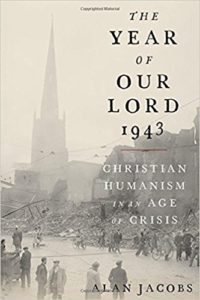 The Year of Our Lord 1943: Christian Humanism in an Age of Crisis Alan Jacobs (Oxford University Press) $25.95 I hope you recall how we announced this earlier, insisting that the idea of it — not to mention the research — was brilliant. Jacobs is a great writer, a remarkably adroit thinker, and here he tells of five major Christian thinkers who, after World War II, published major works questioning the idols of Western culture and wondering how a renewal of a Christian-like humanism might help us survive the coming technocracy. Jacobs explores Christian intellectuals Jacques Maritain, T. S. Eliot, C. S. Lewis, W. H. Auden, and Simone Weil, who “sought both to articulate a sober and reflective critique of their own culture and to outline a plan for the moral and spiritual regeneration of their countries in the post-war world.” This is one of the most learned and vital and valuable books of many a year.
The Year of Our Lord 1943: Christian Humanism in an Age of Crisis Alan Jacobs (Oxford University Press) $25.95 I hope you recall how we announced this earlier, insisting that the idea of it — not to mention the research — was brilliant. Jacobs is a great writer, a remarkably adroit thinker, and here he tells of five major Christian thinkers who, after World War II, published major works questioning the idols of Western culture and wondering how a renewal of a Christian-like humanism might help us survive the coming technocracy. Jacobs explores Christian intellectuals Jacques Maritain, T. S. Eliot, C. S. Lewis, W. H. Auden, and Simone Weil, who “sought both to articulate a sober and reflective critique of their own culture and to outline a plan for the moral and spiritual regeneration of their countries in the post-war world.” This is one of the most learned and vital and valuable books of many a year.
Alan Jacob’s prose wears immense learning lightly, with great grace and to great effect. To think alongside these writers, under Jacobs’s stage direction, to hear them across a gap of three-quarters of a century think with gravity and sincerity, pondering the nature of the human soul, palpably straining toward the ideal of the common good, feeling the pull of their religion’s perennial pitfalls, in a situation and language different from and yet not wholly unlike our own, is riveting, challenging, and life-giving. –Lori Branch, author of Rituals of Spontaneity
Alan Jacobs has written an elegant and deeply learned book on Christian humanism in the critical years of the Second World War. He opens a window into some of the most luminous and profound thinking about the nature and possibilities of civilization during those troubled years. By doing so, has opened a window for thinking about our own troubled times. –James Davidson Hunter, author of To Change the World: The Irony, Tragedy, and Possibility of Christianity in the Late Modern World
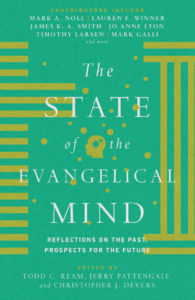 The State of the Evangelical Mind: Reflections on the Past, Prospects for the Future edited by Todd Ream, Jerry Pattengale, and Christopher Devers (IVP Academic) $28.00 This is one of those books that deserves a very thorough study, a review that explains each and every chapter and celebrates the good work of each and every contributor. The work is good and the contributors fascinating — Mark Noll, Lauren Winner, James K.A. Smith, Jo Anne Lyon, Timothy Larson, Mark Gallie, and more. If you are a serious fan of Hearts & Minds you will know why we honor this book as one of the most important of 2018 and you’ll want to have it on your own bookshelf. Heck, you might want to order it and then throw a party. It is not only a good, good book on its own merit, but it stands for something, signifies a renaissance of thoughtful Christian publishing and intentionally deepening of the evangelical mind, even a renewal of faith-based higher education, and a revival of the Christian presence in the arts, a project in which some observers have said we have played a small part. (Okay, only a very small part, but we all need stuff to celebrate, so keep that party going!)
The State of the Evangelical Mind: Reflections on the Past, Prospects for the Future edited by Todd Ream, Jerry Pattengale, and Christopher Devers (IVP Academic) $28.00 This is one of those books that deserves a very thorough study, a review that explains each and every chapter and celebrates the good work of each and every contributor. The work is good and the contributors fascinating — Mark Noll, Lauren Winner, James K.A. Smith, Jo Anne Lyon, Timothy Larson, Mark Gallie, and more. If you are a serious fan of Hearts & Minds you will know why we honor this book as one of the most important of 2018 and you’ll want to have it on your own bookshelf. Heck, you might want to order it and then throw a party. It is not only a good, good book on its own merit, but it stands for something, signifies a renaissance of thoughtful Christian publishing and intentionally deepening of the evangelical mind, even a renewal of faith-based higher education, and a revival of the Christian presence in the arts, a project in which some observers have said we have played a small part. (Okay, only a very small part, but we all need stuff to celebrate, so keep that party going!)
This shift towards better Christian publishing and evangelical perspectives being heard in literature, journalism, science, culture and education, say, is a part of our story and part of the renewal happening with evangelical and church-related colleges, and part of the cause for the remarkable rise of publishers like Baker Academic, Brazos, Crossway, and InterVarsity Academic, all who have brought — like Eerdmans before them — a historic evangelical take on the arts and sciences, culture and creation. That many younger evangelicals have been shaped in recent decades by brilliant scholars and serious writers and the rise of organizations in the arts, marketplaces, and professions taking up the high calling of integrating faith and work, nurturing the habits of the mind, deepening the virtues of the intellectual life, is not to be taken for granted.
This historic renewal of concern for Christian worldviews and a Biblical mindset and strengthening of institutions of higher education and the necessary periodicals and organizations and publishing agendas and institutional networks developed for a reason, and in God’s timing, part of that impetus was the publication of The Scandal of the Evangelical Mind by historian and critic Mark Noll in 1994. The State of the Evangelical Mind emerged from a conference held (at Wheaton College, naturally) to ask the question of how we’ve faired since that hard hitting critique of the lack of a historic, evangelical engagement in scholarship and culture.
This new book, inspired by Noll, and with a major contribution by him, is dedicated to John and Wendy Wilson. John was the erstwhile and colorful editor of one of the most brilliant journals in America, the deeply Christian Books & Culture. That it arose inspired, in part, by Noll’s mid-90s cri de coeur and yet collapsed in the 2015 is a tragedy that should sober any upbeat reading of The State of the Evangelical Mind. Different scholars who contributed to this book have differing takes on what has happened in recent decades, but few can deny there has been a great publishing renaissance since the days when Zondervan published books about John DeLoreans car and Revell made a mint on Marabel Morgan’s Saran Wrap when there were hardly any books on art or science or ecology or film or gender or economics or political theory from a thoughtful Christian viewpoint. My heard starts pounding when I think of how one author, a big name in Christian Bookselling Association circles, threatened to sue us because we said her goofy accusations about Richard Foster being pagan and Ron Sider being a communist was hogwash. Those were the days when a customer of ours circulated a petition against us in part because we carried bookmarks that had rainbows on them, a secret sign of a conspiracy towards One World Government, doncha know?
So, we’ve come a long way. But not far enough along, so that a journal like Books & Culture could survive. This recent book offers a variety of voices on that story, where we’ve been, what’s going on now, and what might be to come. If you know anybody in higher education, any young Christians in graduate school, anyone who does campus ministry and works in higher learning, if you know anybody who is an engaged professional, if you know anybody who reads literary fiction or science journals or The Paris Review or First Things or Tin House or Foreign Affairs, then this book is for them.
Harry Stout, the legendary Jonathan Edwards Professor of American Religious History at Yale says the chapters here are “judiciously rendered thought pieces… uniformly astute, well written, and in short, ruthlessly truthful. The result is a stunning achievement.”
Wilfred McClay of the University of Oklahoma, writes, “If the richness and maturity of a tradition can be judged by the quality of the debate and the healthy self-criticism it generates, then the evangelical intellectual tradition shows itself to be alive and cackling in this stimulating and thought-provoking book.”
Linda A. Livingstone, president of Baylor University, says:
From Mark Noll’s influential Scandal of the Evangelical Mind in 1994 to the thoughtful essays included in The State of the Evangelical Mind, we are reminded — and indeed challenged — to continue cultivating leaders who devote their training and God-given talents to generating solutions and shaping ideas at the highest level of the academy and society.
I am very glad for this book and we award it as one of the Best of the Year.
It is sweet and significant that in the foreword by Rich Mouw he starts with a story from an old acquitance of ours, a Mennonite who was, until his untimely death, the President of near-by Messiah College. (Not too many college Presidents have visited our Dallastown store.) Mouw writes about an observation Rod Sawatsky was fond of making about evangelical higher education. “We give much attention, he would say, about the relationship between faith and learning, but we hear almost nothing about the relationship of hope and love to learning.” Mouw continues, “The explorations in this book make good headway in addressing Rod’s complaint.” Thanks be to God. Tolle lege.
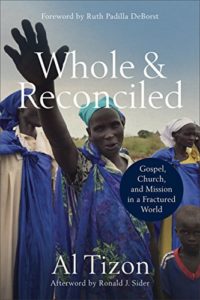 Whole & Reconciled: Gospel, Church, and Mission in a Fractured World Al Tizon (Baker Academic) $22.99 At a bit over 200 pages this book covers so much good stuff it deserves multiple awards — best book on the nature of the gospel, best book of missiology, best book as a foundation for peace and justice work, best book on the Biblical narrative. I suppose I’d celebrate it as one of the best books by a friend who has picked up books from us here at Hearts & Minds. (Runner up to Believe Me author Professor John Fea.) I think it has one of the stronger cover designs, too — what a photo, and what a title.
Whole & Reconciled: Gospel, Church, and Mission in a Fractured World Al Tizon (Baker Academic) $22.99 At a bit over 200 pages this book covers so much good stuff it deserves multiple awards — best book on the nature of the gospel, best book of missiology, best book as a foundation for peace and justice work, best book on the Biblical narrative. I suppose I’d celebrate it as one of the best books by a friend who has picked up books from us here at Hearts & Minds. (Runner up to Believe Me author Professor John Fea.) I think it has one of the stronger cover designs, too — what a photo, and what a title.
So, I am very fond of Al Tizon and have stocked his other books (such as his Judson Press volume Missional Preaching: Engage Embrace Transform.) Al used to work for Evangelicals for Social Action and taught with Campolo and Ron Sider at Eastern University and Palmer Seminary, so it was natural that he helped compile and edit a feschgrift in honor of Sider that was called Following Jesus: Journeys in Radical Discipleship: Essays in Honor of Ronald J. Sider (a former Best Book of the Year award winner from here at Hearts & Minds!) Al Tizon, now executive minister of Serve Globally, the international ministries arm of the Evangelical Covenant Church, is also an affiliate professor at North Park Theological Seminary.He is a man we admire and appreciate.
In a way, it seems that Whole & Reconciled is one of those books a scholar works on his or her whole life, a magnum opus. Yet, Al is no where near the end of his important career and may have even more books in him. But this, this truly is a major contribution, and mighty, multi-disciplinary work, visionary and solid. Whole & Reconciled is doubtlessly one of my favorite books of 2018 and clearly one of the most important books to be released this year.
Some readers will recall that several decades ago there was much conversation about how best to define mission work — words or deeds? evangelism or social action? church planting or development? — and the best thinkers bravely went against the tide of their respective traditions that routinely, often loudly, insisted it was one or the other and said that it must be both. Holistic, intregal, Kingdom advancing ministry was proposed as a Biblically-required and theologically-sound alternative to the typical voices of the fundamentalists and the liberals, both who, in their respective mission agencies and declarations, privileged one approach over and against the other.
Well, years of debate and crisis on the ground caused brilliant work to be done within the evangelical camp — the World Council of Churches and other such groups were more reluctant to revise their social gospel only approach, or so it seems — and an entire body of literature evolved over decades (including statements such as those that came out of Lausanne) that offered a deep and faithful understanding of how Christ is Lord of all of life and therefore redemptive work must be culturally relevant, spiritually and theologically sound, and of solid service to those whom we are called to serve (not least, the poor, sick, and marginalized.) I am confident that some of the very best work done in the last fifty years in global development and majority world contextualized social reform has been led by evangelicals with a deep passion to integrate word and deed, good news and good works. In fact, even the “both/and” approach has been criticized for even assuming there are two aspects of Biblical witness that have to be somehow brought together. Kingdom living is multi-dimensional as all of creation is being healed by Christ so a fully robust missiology has to be more than merely “bringing together” words and deeds.
Well, there hasn’t been a book that has approached this subject so thoroughly in decades and the time is ripe for not only a reminder of the nature of wholistic mission but an updating and even revamping of some of the key themes of this wonderful vision. Whole & Reconciled: Gospel, Church, and Mission in a Fractured World is just the right book at the right time and Al Tizon, himself a Filipino American with much global experience, is just the right author for the job. One of the grandfathers of this move towards wholistic evangelical missiology is Samuel Escobar raves, as does Christopher Wright of Langham Partnership (doubtlessly one of the most important Biblical scholars writing on missional themes in the Scriptures.) Always edgy and poetic Ruth Padilla DeBorst (daughter of another pillar in the movement, Rene Padilla) writes a powerful Foreword and Ron Sider has a very impressive Afterword. In other words, Whole & Reconciled really is considered by many to be a major release and an exceptional new resource for God’s people who care about the world.
The book is arranged in four units, with a couple of great chapters in each. The four parts are Whole World, Whole Gospel, Whole Church, and Whole Mission. Every one of these sections are worth the price of the whole book and Tizon is to be thanked for packing so very much good content in such readable, lively prose. It is for anyone who ponders the implications of the gospel of reconciliation, the transforming power of a Kingdom vision, the adventure that awaits when the whole people of God care about the whole gospel for the whole world. What a book!
Mae Elise Cannon, director of Churches for Middle East Peace and author of Just Spirituality, The Social Justice Handbook, and A Land Full of God: Christian Perspectives on the Holy Land writes:
Whole & Reconciled speaks of the entirety of the gospel without discarding the uncomfortable truths and demands of biblical justice, peacemaking, and reconciliation. Tizon explains how the gospel necessitates the type of reconciliation that penetrates the deepest aspects of individual and community relationships with truth, love, and vulnerability. Read this important book to learn to be challenged to embrace what it means to be truly whole and reconciled.
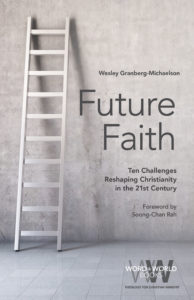 Future Faith: Ten Challenges Reshaping Christianity in the 21st Century Wesley Granberg-Michaelson (Fortress Press ) $18.99 Well. Speaking of discussion about the nature of mission and hearing voices from the global church, of wanting to work for the unity of the Body of Christ — for the sake of the needy world and creation itself, this is an author who has been on the front lines for decades and is a voice you should know, whose books you should read. Wes Granberg-Michaelson has spent his adult life pondering and working on these very things. This is surely, surely, one of the most important books of 2018 — and I think really helpful for anyone involved in church life. The great and interesting foreword by Soong-Chan Rah says it wonderfully, assuring us that this is an excellent tool for local church folks.
Future Faith: Ten Challenges Reshaping Christianity in the 21st Century Wesley Granberg-Michaelson (Fortress Press ) $18.99 Well. Speaking of discussion about the nature of mission and hearing voices from the global church, of wanting to work for the unity of the Body of Christ — for the sake of the needy world and creation itself, this is an author who has been on the front lines for decades and is a voice you should know, whose books you should read. Wes Granberg-Michaelson has spent his adult life pondering and working on these very things. This is surely, surely, one of the most important books of 2018 — and I think really helpful for anyone involved in church life. The great and interesting foreword by Soong-Chan Rah says it wonderfully, assuring us that this is an excellent tool for local church folks.
I suppose you might recall me writing about Granberg-Michaelson’s other books. Years ago he worked for a hero of mine, Senator Mark Hatfield (an anti-war Republican who gave a fantastic keynote talk at one of the early Jubilee conferences in Pittsburgh — that Wes wrote.) He moved over to Sojourners for a while and eventually became a leader in his own denomination, the Reformed Church in America. He has written about leadership and about creation care and has published dozens if not hundreds of articles all over the world. As he describes in his wonderful biography, Unexpected Destinations: An Evangelical Pilgrimage to World Christianity he tells of how an evangelical kid from the mid-West ended up living in Geneva working for the World Council of Churches. His travels among the global church put him in the upper circle of key scholars of global Christianity (in league with Andrew Walls and Philip Jenkins and the recently passed Lamin Sanneh) but he writes more tellingly, with vivid storytelling and obvious investment in church life. His 2013 book From Times Square to Timbuktu: The Post-Christian West Meets the Non-Western Church is more important now than it was 10 years ago.
And so, as we’ve said at BookNotes more than once, Future Faith takes all this stuff about social trends and globalization and multi-ethnicity and the shifts in world Christianity and tells how it effect the ordinary local congregation. It offers us key trends we have to be a part of, one way or another; he pitches them as challenges, but it could just as easily have been written as opportunities. Whether you are a mainline Presbyterian or high-brown Episcopalian or a community church that is non-denominational, a Gosepl Coalition Reformed Baptist or a progressive emergent community or a typical Roman Catholic or Lutheran this book will help you. Some of you will intuitively grasp more than others, some will need more help than others, some churches may be doing well with one challenge but maybe less so on another, but Future Faith is a needed guide. It is vital for all to frame your own ministry and congregational integrity for the next decade.
Not everyone will agree that each of these 10 challenges are as pressing as Wes may say. That’s okay. Even if he’s partially right, there is so much good stuff here to ponder and so many theologically-driven, culturally-savvy imperatives that it is sure to be an aid to your growth in deeper faithfulness. As Soong-Chan Rah says in the foreword, this book will start (or deepen) a conversation, and that’s what is key. It’s why we celebrate Future Faith as one of the most important books of 2018.
Few guides to the future of faith are as trustworthy as Wesley Granberg-Michaelson. This book is filled with wisdom drawn from a lifetime of experience and a heart of passion for the love and justice proclaimed by Jesus. Diana Butler Bass, author Gratitude: The Transformative Power of Giving Thanks
This is an inspiring and encouraging book, with wise insights into what we can and must do to remain faithful to God’s work of renewal in the world. Future Faith disturbed me as it informed me. But, thank God, it also gave me hope. Richard Mouw, President emeritus Fuller Seminary
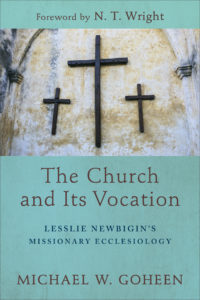 The Church and Its Vocation: Lesslie Newbigin’s Missionary Ecclesiology Michael Goheen (Baker Academic) $22.99 This came out late in the fall and although I can’t say I’ve read every page, I can say that it deserves to be named an an exceptionally notable work. There has been (especially just a couple of years ago) a huge discovery (or rediscovery) of the wonderful work of Lesslie Newbigin. From his many volumes written out of his time in India (where he lived and ministered for most of his adult life) and then his ground-breaking work about how to use contextualization principles (that cross cultural missionaries routinely use) in the post-Christian, secularizing West. In books like Foolishness to the Greeks and The Gospel in a Pluralist Society Newbigin set the stage for what has become the missional church movement. There are bunches of fantastic missional church resources, some quite lively, all indebted to Newbigin.
The Church and Its Vocation: Lesslie Newbigin’s Missionary Ecclesiology Michael Goheen (Baker Academic) $22.99 This came out late in the fall and although I can’t say I’ve read every page, I can say that it deserves to be named an an exceptionally notable work. There has been (especially just a couple of years ago) a huge discovery (or rediscovery) of the wonderful work of Lesslie Newbigin. From his many volumes written out of his time in India (where he lived and ministered for most of his adult life) and then his ground-breaking work about how to use contextualization principles (that cross cultural missionaries routinely use) in the post-Christian, secularizing West. In books like Foolishness to the Greeks and The Gospel in a Pluralist Society Newbigin set the stage for what has become the missional church movement. There are bunches of fantastic missional church resources, some quite lively, all indebted to Newbigin.
Many of the best missional church resources not only attempt to analyze the culture, wondering how the Kingdom of God can break through into that distorted creation that God so loves, but ask what kind of local church do we need to proclaim a missional model, and all-of-life-redeemed Kingdom expression in the world as it is? (For what it’s worth, this is the exact question David Fitch asked in his very impressive IVP book, Faithful Presence: Seven Disciplines That Shape the Church for Mission which was then summarized last year in the pocket-sized Seven Practices for the Church on Mission.)
So, there has been a renewed interest in Newbigin, in his understanding of culture and the missional project, and in his view of Scriptures that yielded such a robust missiology. Many of these books are great, and many of the more popular misisonal books are in discussion with them. Through it all, though, no one figure (in my opinion, at least) has as much insight into Newbigin and his relevance today as Michael Goheen. Those that follow Lesslie Newbigin studies know him well. Interestingly, some of the Dutch neo-Calvniists who talk about worldview and draw on Al Wolter’s often-cited Creation Regained might notice that it was Goheen who did a final chapter in the second edition, and an afterward about how Newbigin’s project of missional church stuff aligned with Al’s Kuyperian worldview and call for distinctively Christian philosophy to fund proper social engagement. Goheen, that is, is an important figure in several different traditions and communities.
Which is a very long way of saying why this book is a must-read, why it should be widely known, and why we want to honor it as a truly vital voice, a major release about a very important topic. What kind of churches do we need to do all this good stuff? I know a book on a South Indian missionary that has eccelisology in the subtitle doesn’t sound like a best-seller, but let us pray that many read it, take up its challenge, and carefully use Newbigin’s good ideas, filtered through Goheen’s good framework, for pushing for congregational renewal that bears fruit fo the Kingdom of God. Out of concern for God’s church we must cry out and push for serious work on parish life. This book will help.
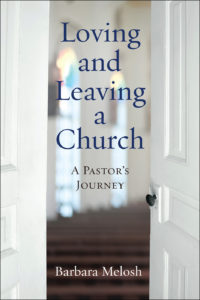 Loving and Leaving a Church: A Pastor’s Journey Barbara Melosh (Westminster John Knox Press) $18.00 We stock so many books for congregational leaders — everything from Abingdon and Alban and the like — but occasionally a book comes along that stands out for it’s literary quality and it’s charm and quiet insight. In the last few years I keep raving about the epistolary novel, Love Big Be Well: Letters to a Small Town Church by Winn Collier (which Eugene Peterson just raved about.) I’ve been on the look-out for something to recommend like that.
Loving and Leaving a Church: A Pastor’s Journey Barbara Melosh (Westminster John Knox Press) $18.00 We stock so many books for congregational leaders — everything from Abingdon and Alban and the like — but occasionally a book comes along that stands out for it’s literary quality and it’s charm and quiet insight. In the last few years I keep raving about the epistolary novel, Love Big Be Well: Letters to a Small Town Church by Winn Collier (which Eugene Peterson just raved about.) I’ve been on the look-out for something to recommend like that.
Loving and Leaving a Church is not fiction, but a memoir of a new Lutheran pastor, a second-career woman, in her first pastorate. She was “brimming with enthusiasm and high hopes.” It was a blue-collar congregation and they’ve had a glorious past but, like many mainline congregations, an uncertain future. Barbara Melosh (formerly a college prof at George Mason) tells her story of trying her best and, finally, realizing the relationship was not a good fit. None of her fresh energy and church growth plans and outreach programs worked; she could not, as she puts it, drag them into a future they did not want.
I get choked up reading even the back cover which says,
Yet while the congregation failed to change itself, Melosh notes, it succeeded in changing her. Simply put, it made her a pastor.
I know pastors whose ministries seem not to bear much earth-shaking fruit, but they love their flock. I know some who captain large and effective institutions, but have little affection for their place or their people. It seems to me — and this good story captures it — that learning to love and serve real people in a real congregation in a real place is most of what a pastor does. Sure, there are programs and worship services and classes and meetings, and it all matters. But this vocation of mediating God’s presence through affectionate solidarity with those God gives to you, being a pastor, is what congregations most need. It is touching, human work, which is why this book, even though some of it is out and out hilarious, is heartbreaking as well.
Richard Lischer (who wrote his own remarkable memoir of this sort, Open Secrets: A Memoir of Faith and Discovery) says Melosh offers “an unflinchingly honest account of how one little group of Saints and Sinners transformed a novice into a pastor.”
It is, Lischer insists:
“Pastoral writing at its best.”
By the way, those of us who are not pastors will enjoy this as well. As Dorothy Bass of the Valparaiso Project says, “…parishioners will see with fresh eyes their own strong role in embodying God’s presence in the particular places where God’s people gather and serve.”
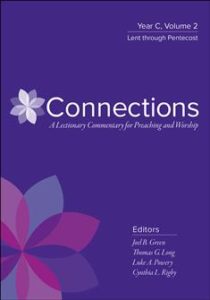
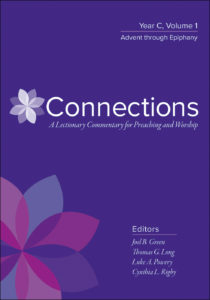
Connections: A Lectionary Commentary for Preaching & Worship – Year C Vol 1 Connections: A Lectionary Commentary for Preaching & Worship – Year C Vol 2 edited by Joel Green, Thomas Long, Luke Powery, Cynthia Rigby (Westminster John Knox Press) $45.00 each
What a grand, lectionary-based set of resources for preaching and worship! In a way, this is the next generation of Feasting on the Word and represents the best thinking on Biblical exegesis, homiletics, personal and social application, all offered with preaching commentary and worship planning ideas for each lectionary reading of the given season. The contributions are wide and broad, with dozens of writers from bunches of denominations, from Evangelical Free and the Christian Reformed Church to the more standard Presbyterian, United Methodist, Lutheran, UCC, and Episcopalian. There are African American exegetes and Latina preachers and Baptist liturgists. What a fun and helpful array of prayerful ideas from stimulating voices.
When we first introduced Volume 1 (Advent through the season of Epiphany to Transfiguration Sunday) we explained more, but allow me to just say this: it is called Connections in part to capture two things: the various contributors working on the lections each week try to show the connections of that Biblical portion to the whole of Scripture, hearing connections between this text and others in Holy Scripture. And, it attempts to offer ideas for making connections between this ancient Word and the world of today. So when it says “connections” it means it — connection the lectionary text to the bigger story of the Bible and connection the worship to real life. Surely one of the best worship aids and liturgical resources in many a year, to be celebrated as a publishing win in 2018. Cheers!
“Here is a resource that puts hundreds and hundreds of focused scholars in the preacher’s study, ready to help shovel the diamonds of Scripture for the Sunday sermon. Every congregation in the country should buy their pastor a complete set, both for their own good and the good of the world.” —Barbara Brown Taylor
Given the deep crisis we face in church and in society, the recovery of the biblical text in all its glorious truth-telling is an urgent task for us preachers. For much too long the text has been neglected through complacency, timidity, and embarrassment. Now is the time of recovery of the text. There are few resources as useful for such a recovery as Connections. It is interpretive work done by our best interpreters, skilled in our best methods, grounded in deep faith, and linked to lived reality. This resource is an immense treasure that invites boldness and imagination in our shared work of proclamation.” —Walter Brueggemann
“In this day when potential listeners are biblically and theologically untutored, distracted and disconnected, Connections is just what the doctor ordered for contemporary preaching. Connections is well named, for it equips preachers to preach sermons that connect with both Scripture and contemporary life, sermons that are both faithful to their biblical contexts and fitting to the contexts of their congregations in the world. Connections provides an antidote to biblical lectures with little acquaintance with contemporary life as well as to strings of stories that lack biblical grounding. We owe the publisher, editors, and authors of this series a debt of gratitude for the gift of this resource for preaching.” —Alyce M. McKenzie Professor of Preaching and Worship, Perkins School of Theology, Southern Methodist University
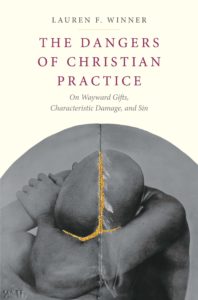 The Dangers of Christian Practice: On Wayward Gifts, Characteristic Damage, and Sin Lauren F. Winner (Yale University Press) $28.00 This is certainly one of the most thoughtful and grand books of 2018 and it is one I am reading so carefully that I am not yet finished! It deserves savoring and pondering. Lauren is a gracious, at times luminous writer and those that love her memoirs will recognize her voice in some of these lovely and poignant stories. Yet, this is a different sort of book (it is on Yale University Press, after all.) More scholarly, more philosophical, she goes to great lengths to be clear about her argument.
The Dangers of Christian Practice: On Wayward Gifts, Characteristic Damage, and Sin Lauren F. Winner (Yale University Press) $28.00 This is certainly one of the most thoughtful and grand books of 2018 and it is one I am reading so carefully that I am not yet finished! It deserves savoring and pondering. Lauren is a gracious, at times luminous writer and those that love her memoirs will recognize her voice in some of these lovely and poignant stories. Yet, this is a different sort of book (it is on Yale University Press, after all.) More scholarly, more philosophical, she goes to great lengths to be clear about her argument.
The first chapter is not quite tedious but it is meticulous. It is exceptionally helpful as she explains what “characteristic” damage is; that is, sins and distortions that are unique to and consonant with and intrinsic to a certain good thing. She gives lots of examples of what she means and what she doesn’t mean, but the upshot is an insightful reminder that some things, even good things, carry with them immense possibility to cause damage, damage unique to their very goodness.
And therein is the genius and profundity of this book, a book unlike any other I know. Many these recent decades are talking about not only inner disciplines but distinctively Christian practices. (Her Mudhouse Sabbath — oh, please tell me you know it! — helped popularize this very language and orientation.) But, to be blunt, can these very practices harm people? Can the joys and healing of, say, receiving communion or saying prayers backfire, so to speak? As one reviewer asks, “Does the church ever hurt those it means to help?”
Here is how Alan Jacobs puts it:
Thoughtful Christians often commend a return to ancient practices of faith as a means of healing spiritual disorders. But what if those practices are themselves damaged? This is the discomfiting question Lauren Winner raises in this curious and remarkable book — a literary and historical meditation on damaged gifts that remain, nevertheless, gifts.
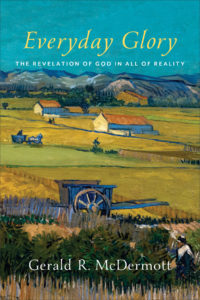 Everyday Glory: The Revelation of God in All of Reality Gerald McDermott (BakerAcademic) $22.99 We have written from time to time about what I call “the spirituality of the ordinary,” When we set up book displays we usually have a dozen titles tucked in among the spiritual disciplines and contemplative guides and mystics that extol finding God in the mundane. Well, this does that, I suppose, but it is more of a theology of the spirituality of the ordinary. It is warm and inviting but meaty. McDermott is a splendid writer, the Anglican Chair of Divinity at Beeson (at Samford University) and here he sees — not unlike Jonathan Edwards who he has studied deeply and draws upon here — in the ordinary stuff of daily life signs and signals of the Trinune God.
Everyday Glory: The Revelation of God in All of Reality Gerald McDermott (BakerAcademic) $22.99 We have written from time to time about what I call “the spirituality of the ordinary,” When we set up book displays we usually have a dozen titles tucked in among the spiritual disciplines and contemplative guides and mystics that extol finding God in the mundane. Well, this does that, I suppose, but it is more of a theology of the spirituality of the ordinary. It is warm and inviting but meaty. McDermott is a splendid writer, the Anglican Chair of Divinity at Beeson (at Samford University) and here he sees — not unlike Jonathan Edwards who he has studied deeply and draws upon here — in the ordinary stuff of daily life signs and signals of the Trinune God.
Peter Leithart wrote a year or so ago a book that trod similar holy ground in Traces of the Trinity: Signs of God in Creation and Human Experience and I think I enjoyed Everyday Glory even more. He offers what one reviewer (Matthew Olver of Nashotah House) a “beauty-saturated theology of creation.” It is designed to help us reject the disenchantment of modernity (which is where the book starts) — why we have failed to experience a robust revelation of God in creation. Even if you aren’t particularly interested in Edwards’s sort of natural theology, this book will help you pay attention to life — all of life, from science to history, sex to sports — through the lens of the glory of God who is revealed in creation. It’s a great book and highly recommended.
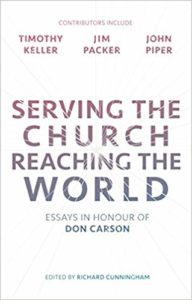 Serving the Church, Reaching the World: Essays in Honour of Don Carson edited by Richard Cunningham (IVP-UK) $15.00 I know his friends call him Don, but most evangelical book buyers who know his vast, important body of work call him D.A. We sold books with him once and didn’t know how to address him, so I called him “Dr. Carson.” As you can see from the funny spelling of “Honour” this is a British book. Technically, it came out in England in late 2017 but it was 2018 until we discovered it here in the States. It is a collection of essays offered in appreciation (a festschrift) for D.A. Carson and brings together a select group of theologians, Bible scholars, mission leaders, seminary thinkers, and those who do apologetics and preaching to offer good pieces. It isn’t a well-known book which is why I want to give a special shout out here as it is a great collection of articles and essays that you won’t find anywhere else.
Serving the Church, Reaching the World: Essays in Honour of Don Carson edited by Richard Cunningham (IVP-UK) $15.00 I know his friends call him Don, but most evangelical book buyers who know his vast, important body of work call him D.A. We sold books with him once and didn’t know how to address him, so I called him “Dr. Carson.” As you can see from the funny spelling of “Honour” this is a British book. Technically, it came out in England in late 2017 but it was 2018 until we discovered it here in the States. It is a collection of essays offered in appreciation (a festschrift) for D.A. Carson and brings together a select group of theologians, Bible scholars, mission leaders, seminary thinkers, and those who do apologetics and preaching to offer good pieces. It isn’t a well-known book which is why I want to give a special shout out here as it is a great collection of articles and essays that you won’t find anywhere else.
I don’t agree with everything this brilliant man writes and his Gospel Coalition tribe isn’t exactly our own, but anybody who cares about thoughtful, culturally-relevant, Biblically-faithful, solid stuff should pay attention to those who have stood beside him or on his shoulders. Here are some who have contributed to Serving the Church, Reaching the World — William Edgar, Kirsten Birkett, Timothy Keller, J.I. Packer, John Piper, and the editor, Richard Cunningham, who is an ordained Anglican ministry (in the Church of England) and is the Director of the Universities and Colleges Christian Fellowship (UCCF.)
Topics include (among others) “Winning Hearts and Minds in a Secular Age”, Tim Keller on “University Missions Today” and Packer on “Preacher and Theologian: The Ideal Christian Communicator.” Piper has a powerful essay about service and suffering and there’s several potent chapters on truth, apologetics, ecumenical cooperation. Jazz-man and WTS prof Bill Edgar has a strong essay called “The Silence of God.” This is a fascinating, little known anthology and we want to celebrate it, even as it celebrates an author of over 50 books, D.A. Carson. Kudos.
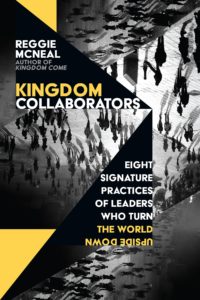 Kingdom Collaborators: Eight Signature Practices of Leaders Who Turn the World Upside Down Reggie McNeal (IVP) $16.00 This is another great book that comes from IVP’s Praxis imprint and we are thrilled to say we stock them all, including a big stack of this one. We have long appreciated Reggie’s upbeat, stimulating (but exceptionally well-informed and thoughtful) approach to missional church and Kingdom living. We want to honor this as one of the books we were excited about this year, in part because it is practical and useful for church and ministry leaders — not “running over the same old ground” as Pink Flloyd puts it in “Wish You Were Here” — but also because, well, did you see what I did there? This is a book for church and parish leaders but it is not mostly or exclusively about the local church but about the reign of God in the world God loves. That is, it is about the culture, about the Kingdom coming in all of life, about entrepreneurial visions and world-changing efforts to make a difference. Do you want to be that kind of a church leader, equipping your people to serve their city, to care for their neighborhoods, to represent God’s grace in various institutions of your locality?
Kingdom Collaborators: Eight Signature Practices of Leaders Who Turn the World Upside Down Reggie McNeal (IVP) $16.00 This is another great book that comes from IVP’s Praxis imprint and we are thrilled to say we stock them all, including a big stack of this one. We have long appreciated Reggie’s upbeat, stimulating (but exceptionally well-informed and thoughtful) approach to missional church and Kingdom living. We want to honor this as one of the books we were excited about this year, in part because it is practical and useful for church and ministry leaders — not “running over the same old ground” as Pink Flloyd puts it in “Wish You Were Here” — but also because, well, did you see what I did there? This is a book for church and parish leaders but it is not mostly or exclusively about the local church but about the reign of God in the world God loves. That is, it is about the culture, about the Kingdom coming in all of life, about entrepreneurial visions and world-changing efforts to make a difference. Do you want to be that kind of a church leader, equipping your people to serve their city, to care for their neighborhoods, to represent God’s grace in various institutions of your locality?
This book works on a number of levels. It is energizing and visionary, of course. And in a way it is a sequel to his Kingdom Come which is passionate and upbeat about the reality of the Kingdom of God. But it is also about leadership and it is about collaboration, a matter to which we don’t pay enough attention, I think. And it is about a certain sort of audacious collaboration — not just with other leaders in your church, not even with other churches, but other community leaders, and other community institutions. This isn’t new for most mainline folks, but for more evangelical folk, it may be a stretch. I think he makes a great case for this and invites us to new forms of worldly holiness and healthy collaboration.
Just for instance, listen to this testimonial by Lee Clamp, a Baptist woman who was part of a McNeal-inspired consultation: “Do you long to see broken lives restored? New life is the drive of Kingdom Collaborators. Reggie’s passion for people is felt on every page, and he lives what he writes. He has helped us to birth a statewide coalition focused on awakening the faith-based community to bring hope to every child through serving our local schools. Be warned―reading Kingdom Collaborators may be hazardous to your comfortable life. It will change your status quo, muddy your hands, and free you from a predictable life!”
As Susan Hewitt of UpWorks in St. Paul Minnesota writes,
The transformation of a community begins with the transformation of an individual. Whether one is a leader, collaborator, or follower, Reggie provides kingdom thinking to help unlearn traditions that are hindering our witness and work and relearn biblical principles that will unleash God’s people. I believe this inspired book will help Christians join with God in his kingdom agenda, accelerating improvement on societal issues that is so desperately needed.
Here is how another United Methodist leader puts it:
Perhaps, for such a time as this, Jesus is changing our minds as it relates to understanding the call of all people. Perhaps now is the time that God is calling kingdom leaders to agitate for the kingdom, knowing that the agitation and advancement of God’s kingdom is done with collective force and efforts. Kingdom Collaborators is the book to arrest your heart, expand your understanding, and prod you to move into God’s calling no matter if you are clergy or congregant! — Aleze M. Fulbright, director of leadership development, Indiana Conference of the United Methodist Church
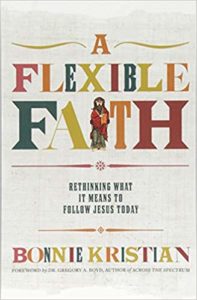 A Flexible Faith: Rethinking What It Means to Follow Jesus Today Bonnie Kristian (FaithWords) $14.99 This has been a book that I’ve talked about when we’ve been out at events but it is tricky to explain. It is charming, wonderfully written, upbeat and fun and yet I’d suggest it is deadly serious. It is about the stream of Christian orthodoxy which is “wide and deep but most Christians only swim in their own little pool.” There is more than one viable option to unbelief and to understand this is absolutely critical. It is important as we learn to get along with the body of Christ and it is important as we invite seekers and the disillusioned to sustainable faith when they’ve left the one sort of faith expression they thought was normative.
A Flexible Faith: Rethinking What It Means to Follow Jesus Today Bonnie Kristian (FaithWords) $14.99 This has been a book that I’ve talked about when we’ve been out at events but it is tricky to explain. It is charming, wonderfully written, upbeat and fun and yet I’d suggest it is deadly serious. It is about the stream of Christian orthodoxy which is “wide and deep but most Christians only swim in their own little pool.” There is more than one viable option to unbelief and to understand this is absolutely critical. It is important as we learn to get along with the body of Christ and it is important as we invite seekers and the disillusioned to sustainable faith when they’ve left the one sort of faith expression they thought was normative.
A Flexible Faith might be found somewhere in the middle, then, between Richard Foster’s must-read Streams of Living Water and Brian McLaren’s clever and feisty A Generous Orthodoxy.
Kristian says she has written for the convinced and the confused alike. I”d agree — if you know what you belief and why you belief it, it doesn’t hurt to learn about others who see things differently and if you are confused this will not only say “welcome to the club” but will lay out some options and offer resources for finding some resolution to questions of faith and practice.
Here is how it works. I will be brief, but I could write a long time about various stuff she writes here. There are two things Kristian does: first, she does a survey of various views of several topics. (That is, for instance, she’ll show both sides of an issue saying some Christian believe this and other Christians belief that. She tips her hand and says why. In this regard, this is a nice handbook to what the primary views are of everything from God’s providence to Christian involvement in war; from what the Lord’s Supper means to the ethics of LGTBQ sexual relationships. In every other chapter she shows that some Christians think one way but others another way about this or that theological, church, and discipleship question. If all she did was offer this fair-minded survey we’d have much to be thankful for.But the other concern of this book isn’t just to struggle with abstract doctrines and social issues, laying out this and that viewpoint and comparing those that hold to this Bible text to those that emphasize that Bible text. No, this is about really appreciating each other, so she has these rather wild and interesting interviews with all kinds of unique Christian folks.
What do I mean? Here’s you’ll find fascinating conversations with a member of a Benedictine monastery; you’ll learn about Quakerism. There’s an interview with a member of the Bruderhof (who published Plough) and you’ll meet a Messianic Jew. From Randy Woodley (a Native American follower of Jesus) to a Q& A with Dr. Simon Chan, a Pentecostal intellectual to a gent from the Coptic Orthodox Church, you’ll be enchanted to hear about so many different expressions of faith. From those who hold a common purse to the Amish to a Seventh Adventist to one who is part of a Latin American base community, you’ll discover so many different ways to be faithful. You will have to re-think, at least for a bit, what it means to follow Jesus today. Perhaps you will become more generous towards others. Perhaps you will become a bit more flexible. Who knows, perhaps it will be a life-line for somebody you know. It’s a fun read and would be great to work through with a book club.
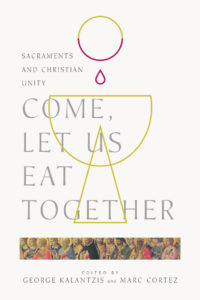 Come Let Us Eat Together: Sacraments and Christian Unity edited by George Kalantzis and Marc Cortez (IVP Academic) $26.00 This is one of the books I was most happy to see this year and sad that I haven’t found time to study it much. It is one of the annual books IVP Academic releases — thanks be to God for their publishing savvy and integrity! — that comes from an annual theology conference at Wheaton College. This book nicely offers the papers and panels and keynotes and sermons from the previous years event on unity within the Body of Christ, especially around our differing view of sacraments. (By the way: last year’s Wheaton conference was on Marilyn Robinson, so the forthcoming volume that IVP will release will be among the most eagerly anticipated books of 2019!)
Come Let Us Eat Together: Sacraments and Christian Unity edited by George Kalantzis and Marc Cortez (IVP Academic) $26.00 This is one of the books I was most happy to see this year and sad that I haven’t found time to study it much. It is one of the annual books IVP Academic releases — thanks be to God for their publishing savvy and integrity! — that comes from an annual theology conference at Wheaton College. This book nicely offers the papers and panels and keynotes and sermons from the previous years event on unity within the Body of Christ, especially around our differing view of sacraments. (By the way: last year’s Wheaton conference was on Marilyn Robinson, so the forthcoming volume that IVP will release will be among the most eagerly anticipated books of 2019!)
Come Let us Eat Together is not as fun and funny and curiously charming as the above mentioned invitation to flexible faith, and it may not be a big seller, which is all the more reason we want to honor it here, now. We dare not be glib about the brokenness of Christ’s church and perhaps studying these chapters by classic Protestant, Roman Catholic, and Eastern Orthodox theologians, who consider what it means to proclaim the unity of the body of Christ in light of the sacraments, will help.
These essays offer unflinching honest, surprising humor, keen insight, and possible ways forward as they wrestle with hard questions about why Christian are and remain divided over what should unite us: the sacraments of baptism and the Lord’s Supper . James R Payton, Redeemer University College
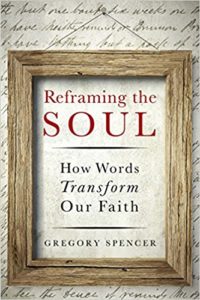 Reframing the Soul: How Words Transform Our Faith Gregory Spencer (Leafwood) $15.99 This is one of the great, notable books of 2018 and because it is on a smaller publishing house my fear is that it may not be widely known. I did a long review of it last summer at BookNotes and explained it my admiration for the author and detailed the nature of the book.
Reframing the Soul: How Words Transform Our Faith Gregory Spencer (Leafwood) $15.99 This is one of the great, notable books of 2018 and because it is on a smaller publishing house my fear is that it may not be widely known. I did a long review of it last summer at BookNotes and explained it my admiration for the author and detailed the nature of the book.
Here is one small part of that review:
On the back cover of Reframing the Soul we get a glimpse of what Spencer is up to when he tells of “four essentials of the soul.”
- Remembering the past with gratitude
- Anticipating the future with hope
- Dwelling within ourselves in peace
- Engaging with others in love
There are the four main units of this book. After several opening chapters he gets to these four chief tasks (remembering, anticipating, dwelling, engaging) but the opening four chapters are worth the price of the book. And they are memorable – “Every Word a Window,” “There Is No Immaculate Perception,” “Order, Order, Everywhere,” and “When You Frame Your Life, What’s in the Picture?”
Then Spencer opens up the discussions about how new words can reframe and set us free from less than life-giving, less-than-adequate perceptions. Please note, this is not some technique like “neuro-linguistic programming” nor some name-it-and-claim it nonsense about positive confession. It is wise and nuanced council about reframing our stories based on how we choose to tell those stories, inspired, as we can be, by Biblical truths and spiritual discernment.
I know some of our customers rightly adore the book To Be Told: God Invites You to Co-Author Your Future by Dan Allender, who also reminds us to reframe our past and present to get to a renewed future. This new Reframing the Soul book by Gregory Spencer is worth having and highly recommended for those wanting a very impressive read about “navigating reality with grace and truth.” And hope.
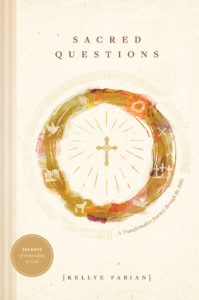 Sacred Questions: 365 Days of Responding to God Kellye Fabian (NavPress) $22.99 Every year there are very nice devotionals and some years there are extraordinary ones released. Certainly 2018 was a banner year, with a small one from the late Eugene Peterson on key Old Testament texts (Every Step an Arrival: A 90-Day Devotional for Exploring God’s Word; Waterbrook Press; $14.99) and, of course, God’s Wisdom for Navigating Life: A Year of Daily Devotions in the Book of Proverbs by Tim and Kathy Keller (Viking; $20.00) which many folks used all year long, just like they used their wonderful book devotional on Psalms the year before.
Sacred Questions: 365 Days of Responding to God Kellye Fabian (NavPress) $22.99 Every year there are very nice devotionals and some years there are extraordinary ones released. Certainly 2018 was a banner year, with a small one from the late Eugene Peterson on key Old Testament texts (Every Step an Arrival: A 90-Day Devotional for Exploring God’s Word; Waterbrook Press; $14.99) and, of course, God’s Wisdom for Navigating Life: A Year of Daily Devotions in the Book of Proverbs by Tim and Kathy Keller (Viking; $20.00) which many folks used all year long, just like they used their wonderful book devotional on Psalms the year before.
I liked Kellye Fabian’s in part because it was arranged with so many good questions, inviting a pondering about the text and its application. It isn’t quite lectio but it does invite readers into this practice of a close reading and attending to questions that arise from the text. I think this stimulates the mind and enlarges the heart as readers “learn how to partner with God and live the full, free, and other-centered life Jesus offers.” Ms. Fabian holds a certificate of spiritual formation through Ruth Haley Barton’s Transforming Center and has studied with Scot McNight at Northern Seminary. This is a handsome hardback, just shy of 500 pages.
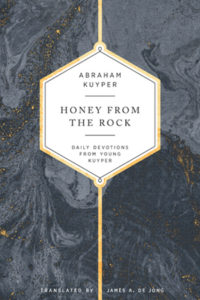 Honey From the Rock: Daily Devotions from Young Kuyper Abraham Kuyper (Lexham Press) $39.99 I very much want to honor this remarkable new release — sweet devotional meditations from the brilliant and legendary Dutch theologian cum social reformer cum statesman that, as far as I know, have never before been translated into English. Like the other big, hefty, well-crafted and helpfully annotated volumes coming out in the Kuyper Translation Project, it should be considered a publishing event to have this content released to the English-speaking world. And what a treasure this is, revealing again a side of himself that may not be as obvious in his theological work or his cultural analysis. (The Kuyper Translation Project, capably overseen by Melvin Flikkema & Jordan Ballor, has released oversized hardbacks of Kuyper’s work on public theology, common grace, politics, Islam, and has volumes coming out on topics such as education, economics, and justice.) Still, Kuyper religiously wrote weekly meditations, even in his most harried days as Prime Minister. He continued this practice up until his death in 1920. These newly released reflections, freshly translated by James De Jong, arose from the 1870s or so. (They were originally published and beloved a century ago in two volumes in Dutch.)
Honey From the Rock: Daily Devotions from Young Kuyper Abraham Kuyper (Lexham Press) $39.99 I very much want to honor this remarkable new release — sweet devotional meditations from the brilliant and legendary Dutch theologian cum social reformer cum statesman that, as far as I know, have never before been translated into English. Like the other big, hefty, well-crafted and helpfully annotated volumes coming out in the Kuyper Translation Project, it should be considered a publishing event to have this content released to the English-speaking world. And what a treasure this is, revealing again a side of himself that may not be as obvious in his theological work or his cultural analysis. (The Kuyper Translation Project, capably overseen by Melvin Flikkema & Jordan Ballor, has released oversized hardbacks of Kuyper’s work on public theology, common grace, politics, Islam, and has volumes coming out on topics such as education, economics, and justice.) Still, Kuyper religiously wrote weekly meditations, even in his most harried days as Prime Minister. He continued this practice up until his death in 1920. These newly released reflections, freshly translated by James De Jong, arose from the 1870s or so. (They were originally published and beloved a century ago in two volumes in Dutch.)
Honey From the Rock is to be celebrated because of its warm piety (think of his wonderful collection of meditations Near Unto God) but this release is of historical value, too, because, as the widely-read Albert Mohler puts it, “Imagine opening a collection of meditations by the young Augustine, a young Martin Luther, or John Calvin… Here are the devotional thoughts of one of the most significant Protestant thinkers of the last 150 years from the most formative period of his life. This treasure is both timeless and timely.”
Of course, Richard Mouw has a blurb on the back, saying:
I have been reading Kuyper’s Near Unto God collection of meditations for decades — so much so that I wore out my first copy. He is my favorite devotional writer. And now this wonderful collection of 200 more. I hope all who have come to appreciate Kuyper’s writings on politics and culture in recent years will now taste the spiritual sweetness of Honey from the Rock.
One word of protest: this book should not have been published as an oversized, expensive hardback (although it is very nice.) Who wants to hold an immense volume the size of a dictionary in their morning or evening devotions? Who can shell out this kind of cash for a devotional? I suppose Lexham or the Translation Society wanted this to handsomely fit on a shelf with the other oversized Kuyper hardbacks, but this is a foolish mistake. Can we award it next year as the best paperback re-issue with a handsome, inexpensive cover? This lovely book is worth marketing widely and it is bad stewardship to not make it affordable and widely distributed. For those who already see themselves as Kuyperians, though, Honey from the Rock is a worthy, wonderful investment and I hope and pray that it sells well.
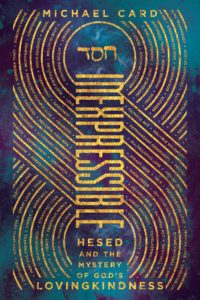 Inexpressible: Hesed and the Mystery of God’s Lovingkindness Michael Card (IVP) $16.00 . Mike is a good, good guy, a thoughtful poet, and good writer, a fabulous singer-songwriter, recording artist, and serious scholar of the Scriptures. This book came out the last weeks of December and we wondered if anyone would notice it amidst the best-sellers and holiday glitz. A number of our local friends picked it up and more than one person raved about it within days! It is nice study of God’s identity, beyond what we can imagine, let alone express in human words. But, as Card explains, “Scripture uses one particular word to describe the distinctiveness of God’s character: the Hebrew word hesed.”
Inexpressible: Hesed and the Mystery of God’s Lovingkindness Michael Card (IVP) $16.00 . Mike is a good, good guy, a thoughtful poet, and good writer, a fabulous singer-songwriter, recording artist, and serious scholar of the Scriptures. This book came out the last weeks of December and we wondered if anyone would notice it amidst the best-sellers and holiday glitz. A number of our local friends picked it up and more than one person raved about it within days! It is nice study of God’s identity, beyond what we can imagine, let alone express in human words. But, as Card explains, “Scripture uses one particular word to describe the distinctiveness of God’s character: the Hebrew word hesed.”
This is part semi-academic study, part devotional, part memoir of how this author came to be so deeply moved by this deep, multi-dimensional meaning of hesed and of the great God who reflects such loving fidelity. Of course, he helpfully reminds us that the fullness of hesed is embodied in the incarnation of Jesus, the God of hesed made flesh.
Can we be transformed as we ourselves become marked by compassion, mercy, faithfulness? This book will help. Inexpressible is a beautiful, powerful read. Kudos.
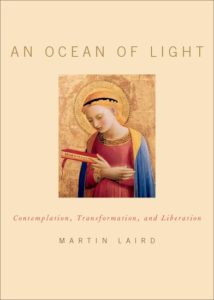 An Ocean of Light: Contemplation, Transformation, and Liberation Martin Laird (Oxford University Press) $18.95 I have not read this yet but many people I deeply trust have commended Laird’s first two, Into the Silent Land and A Sunlit Absence. These mixed metaphors and allusive titles should be a clue that these rich and deep. The handsome covers makes you want to hold these small hardbacks and take in their beauty. Blurbs on this much anticipated work are by Sarah Caokley, Carol Zaleski, and the former Archbishop of Canterbury, Rowan Williams (who commends it for resisting “verbiage, mystification and sentimentality”) and who says it is “both intensely challenging and enriching.”
An Ocean of Light: Contemplation, Transformation, and Liberation Martin Laird (Oxford University Press) $18.95 I have not read this yet but many people I deeply trust have commended Laird’s first two, Into the Silent Land and A Sunlit Absence. These mixed metaphors and allusive titles should be a clue that these rich and deep. The handsome covers makes you want to hold these small hardbacks and take in their beauty. Blurbs on this much anticipated work are by Sarah Caokley, Carol Zaleski, and the former Archbishop of Canterbury, Rowan Williams (who commends it for resisting “verbiage, mystification and sentimentality”) and who says it is “both intensely challenging and enriching.”
Rowan Williams continues:
His writing on this subject is simply in a different league of seriousness from most other books on ‘spiritual’ practice.
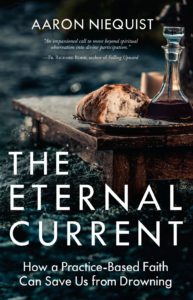 The Eternal Current: How a Practice-Based Faith Can Save Us From Drowning Aaron Niequist (Waterbrook) $19.99 Books on contemplative practices and monastic spiritual disciplines and a more centered sort of spirituality keep coming out and our shelves in that category are bulging. There’s a lot of good stuff on various kinds of spiritual practices and many are wonderful. Some are more Christ-centered and Biblically-oriented then others, but many, many help people focus on their interior lives and find God’s presence in the midst of their daily lives. However, every now and then one comes along that seems truly fresh, different, passionate, and which resonates with me. This is one of those.
The Eternal Current: How a Practice-Based Faith Can Save Us From Drowning Aaron Niequist (Waterbrook) $19.99 Books on contemplative practices and monastic spiritual disciplines and a more centered sort of spirituality keep coming out and our shelves in that category are bulging. There’s a lot of good stuff on various kinds of spiritual practices and many are wonderful. Some are more Christ-centered and Biblically-oriented then others, but many, many help people focus on their interior lives and find God’s presence in the midst of their daily lives. However, every now and then one comes along that seems truly fresh, different, passionate, and which resonates with me. This is one of those.
I think this is one of the most interesting books I read all year, and one I grew increasingly enamored with. You can read my previous comments an at older BookNotes, but I’ll just note that he uses the “river” motif, and it is a healing River, “ushering in the healing and restoration of all things.” Jesus called this river “The Kingdom of God” and invited us to enter it. Niequist says that Jesus’s call to “follow me” could be interpreted as an invitation to learn to swim in this Eternal Current. The invitation is participation.
That is what he means by a “practice-based faith” which is more than merely proper belief. We must be swept into God’s redemptive work in our lives and in the world. “We can move from the dry riverbed of static faith into the gushing Current of a practice-based faith.” So, yes, this engaging and creatively written book offers a vision and a set of practices for deeper discipleship, lived, experienced faith, spiritual formation that goes beyond some tribal sort of certainty and into the bigger mystery of belonging to Christ and being involved in His work.
I like this trans-rational (not-irrational, of course) view, that faith is more than intellectual ideas or cognitive assent. And, I am glad that Niequist always remind us that the River is for the sake of the world. HIs notion that church is a gymnasium (chapters 4 and 5) that affirms and trains us as we gather (and so, chapter 6 is called “Sunday is Not the Main Event”) is worth the price of the book. I’m fond of any book that has a chapter on ecumenism (“We Need Everybody”) and community (“We Can’t Do It Alone.”) His showing these important insights in this creative a language that moves increasingly outward towards mission is right on. His reminder of the role of imagination as we “reintegrate everything” is a beautiful benediction of a provocative and energizing book. I hope you, too, find it one of the more stimulating titles you’ve read in quite a while.
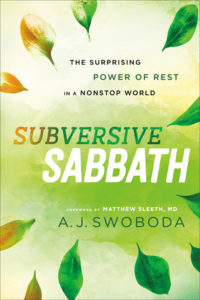 Subversive Sabbath: The Surprising Power of Rest in a Nonstop World A.J. Swoboda (Brazos Press) $19.99 This is another one that I hope you saw our long review at BookNotes. Even as I was describing it back then, I knew it was a contender for one of the very Best Books of 2018. It is comprehensive, interesting, theological, Biblical, and practical. It offers insight about keeping Sabbath, of course, but also offers broader guidance about the necessity of (our our reluctance to) rest. Importantly, it moves to how such nay-saying to busyness — “ceasing” is a word Marva Dawn used in her late ’80s, seminal Keeping the Sabbath Wholly — is, as the title says and he really means, subversive. There are idols and bad habits and dysfunctions in the world and our health and our very lives (not to mention our Kingdom loyalties) depends on resisting them. There is great power in saying no and keeping Sabbath and living within its rhythms can undo the grip of consumerism and workaholism and pride and violent.
Subversive Sabbath: The Surprising Power of Rest in a Nonstop World A.J. Swoboda (Brazos Press) $19.99 This is another one that I hope you saw our long review at BookNotes. Even as I was describing it back then, I knew it was a contender for one of the very Best Books of 2018. It is comprehensive, interesting, theological, Biblical, and practical. It offers insight about keeping Sabbath, of course, but also offers broader guidance about the necessity of (our our reluctance to) rest. Importantly, it moves to how such nay-saying to busyness — “ceasing” is a word Marva Dawn used in her late ’80s, seminal Keeping the Sabbath Wholly — is, as the title says and he really means, subversive. There are idols and bad habits and dysfunctions in the world and our health and our very lives (not to mention our Kingdom loyalties) depends on resisting them. There is great power in saying no and keeping Sabbath and living within its rhythms can undo the grip of consumerism and workaholism and pride and violent.
This is a topic that is urgent, a book that is exceptional, and if you don’t have time to read it, you know you need it. We think that Subversive Sabbath is is one of our favorite books of the year, one we are happy to commend and that we hope is enduring among the other good books on the topic. Thanks to A.J. for doing so much work on this and for being so artful and inspiring as a writer. Good job.
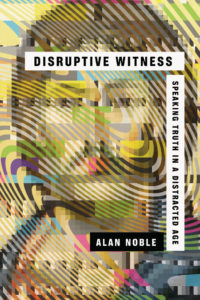 Disruptive Witness: Speaking Truth in a Distracted Age Alan Noble (IVP) $16.00 In just a few weeks we will finally get to meet Alan Noble, a professor of English and editor of the very cool Christ and Pop Culture online journal, who will be speaking at the CCO’s annual Jubilee conference in Pittsburgh. I will applaud him personally for writing one of the best books of 2018 and thank him for creating a book that became one of store’s best sellers. It’s the kind of thoughtful but readable book we are so glad to sell. He has written for the Atlantic, Vox, Buzzfeed, Christianity Today, First Things and The Gospel Coalition. We’ve been facebook friends for years, and he really gets around. I say this not only to assure you he’s a good good guy, but to suggest that even though this is a critique of our hot-wired, fast-paced, digital lives that yield distraction and worse, he is no “Benedict Option” advocate, not one who has escaped the world of media and popular culture. He is trying hard to that noble view of being in-but-not-of as Jesus said.
Disruptive Witness: Speaking Truth in a Distracted Age Alan Noble (IVP) $16.00 In just a few weeks we will finally get to meet Alan Noble, a professor of English and editor of the very cool Christ and Pop Culture online journal, who will be speaking at the CCO’s annual Jubilee conference in Pittsburgh. I will applaud him personally for writing one of the best books of 2018 and thank him for creating a book that became one of store’s best sellers. It’s the kind of thoughtful but readable book we are so glad to sell. He has written for the Atlantic, Vox, Buzzfeed, Christianity Today, First Things and The Gospel Coalition. We’ve been facebook friends for years, and he really gets around. I say this not only to assure you he’s a good good guy, but to suggest that even though this is a critique of our hot-wired, fast-paced, digital lives that yield distraction and worse, he is no “Benedict Option” advocate, not one who has escaped the world of media and popular culture. He is trying hard to that noble view of being in-but-not-of as Jesus said.
Yet, he’s astute — more than most — about the pressures of modernity and the temptations of the modern age (and he shares candidly about this in the book in ways that will make you nod your head.) In this he has learned from Charles Taylor and the first half of this book “The Distracted, Secular Age” draws on Taylor and adds his own unique concerns about the barriers of endless distraction and the confusions of our identity (and what Charles Taylor calls “the buffered self.”) He says we are all seeking better visions of fullness, and to this complicated world we must bear a disruptive witness. Part Two shows us how to do that.
There are habits to disrupt the distraction that we must learn and practice and these must be embodied in our own lives, encouraged in our churches, and that should shape our cultural participation (our tone and texture and style and attitude, not just what content we do or don’t promote.) In many ways, McLuhan’s “the medium is the message” is a truism we must grapple with and Noble helps us think that through and equips us to “disrupt our society’s deep-rooted assumptions and point beyond them to the transcendent grace and beauty of Jesus.”
This is a book well worth reading carefully and slowly and talking about with others. I hope you can find a few good and honest friends to work through the distractions in our lives and how to disrupt them. This isn’t a cheap “just say no” to technology or busyness or secularism or a scolding to be more bold for Christ. It is a deep level study of the forces and ethos and practices of our technological age and a good, healthy, redemptive framework for standing a chance at not be done in by it all. At the end of the day (although I am a bit reluctant to sell short a nearly 200 page book with a quick summary) this invites us to slow down and pay attention and ponder and consider things. As we learn to attend to the world around us and read and pray and think, we can see that transcendence is more plausible than the secular age admits, more available than our fast-paced lives seem to permit. So settle down, folks, resist the disruption. Along with Swoboda’s Subversive Sabbath practices [see above], and armed with this insightful cultural analysis, we really can speak truth in a a distracted age.
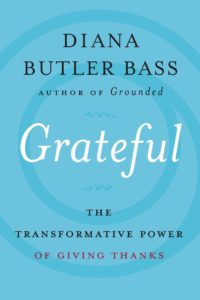 Grateful: The Transformative Power of Giving Thanks Diana Butler Bass (HarperOne) $26.99 I regularly promote books from denominational perspectives and faith traditions and experiences that are not my own. Obviously — what bookseller only promotes the books that fully reflects their own denomination and life? We here at Hearts & Minds, are, in fact, deeply grateful for the opportunity to read widely, taking in books and insights and strengths from others with whom we may disagree. I don’t know why I write this, now, leading in to our celebration of Diana’s good book because there is very little I disagree with here. It’s just that she is situated as a nationally-known critic of establishment religion, hard on conservative denominations, and always prophetic even in challenging her own progressive Episcopalian faith communities. She pushes churches to embrace new ways of thinking about faith that are sensible to the growing “spiritual but not religious” crowd and insists that an inclusive, generous faith is not only most reflective of the God who is revealed in Jesus of Nazareth but also most effective in resonating with the post-Christian milieu of our days. I don’t always see it like that, but I read anything she rights and am grateful for her work, her words, her friendship.
Grateful: The Transformative Power of Giving Thanks Diana Butler Bass (HarperOne) $26.99 I regularly promote books from denominational perspectives and faith traditions and experiences that are not my own. Obviously — what bookseller only promotes the books that fully reflects their own denomination and life? We here at Hearts & Minds, are, in fact, deeply grateful for the opportunity to read widely, taking in books and insights and strengths from others with whom we may disagree. I don’t know why I write this, now, leading in to our celebration of Diana’s good book because there is very little I disagree with here. It’s just that she is situated as a nationally-known critic of establishment religion, hard on conservative denominations, and always prophetic even in challenging her own progressive Episcopalian faith communities. She pushes churches to embrace new ways of thinking about faith that are sensible to the growing “spiritual but not religious” crowd and insists that an inclusive, generous faith is not only most reflective of the God who is revealed in Jesus of Nazareth but also most effective in resonating with the post-Christian milieu of our days. I don’t always see it like that, but I read anything she rights and am grateful for her work, her words, her friendship.
Which is where I’m going with this: I am deeply grateful for this book, Grateful, and am glad to honor it as one of the Best Books of 2018. I certainly was one I enjoy immensely, even if it tweaked me in hard ways, in painful places. How can we be grateful in these awful days of political divisiveness and social injustice and a President I cannot be grateful for. When black men are gunned down by white policeman, when otherwise good Christian people stimulate hateful attitudes towards refugees and the homeless, when the planet groans so loudly even as we cut funding for agencies designed to steward our natural resources, when marriages fail and cancer strikes, how in the hell are we supposed to be grateful? I resist glib bromides of counting your blessings and Hallmark sentiments about serenity. I know it is extraordinarily radical, but I find John Piper’s Lewis-esque call to joy somehow amiss, unless accompanied (as it often is in Piper) by tears of lament.
And so, I am grateful for Grateful as it is one of the few authors who I would trust to walk us through this joy-producing, generous, beautiful spiritual discipline. Diana starts the book noting that she wrote this in part as a way to cope with her own frantic worry over the election of Donald Trump and her horror at the casual way some accept his jokes about sexual assault, off-handed racism, and celebration of greed and glitz. As a historian, she was well equipped to get us beyond “cheap gratitude” (a brilliant line she offers in the prologue.) As one skilled in the social sciences, she uses as another point of departure two seemingly contradictory recent surveys of the mood of Americans and I appreciate her blend of personal anecdotes, historical insight, and up-to-date social analysis. Grateful: The Transformative Power of Giving Thanks has become my favorite book on the subject in part because of this big picture lens and how she moves us towards the civic implications of a conscientious commitment to thankfulness.
We are not alone in honoring this interesting and helpful book. There is a lovely blurb on the back by Shauna Niequist, a thoughtful evangelical, James Martin, the best-selling and widely respected Jesuit, “Science Mike” McHargue (who calls it “a calming voice in raging cultural seas.”) Her friend Brian McLaren loves it, as does the non-Christian writer Marianne Williamson (who says, alluding to Julian, “her words are a gentle but fierce reminder that on some eternal level , all is well.”
Listen to Rev. Jacqueline Lewis, co-author of The Pentecost Paradigm and senior minister at Middle Collegiate Church in New York:
Grateful will soften the lens through which you look at the people in your life, and the whirling world around us all. It’s a spoonful of honey to help us transform the ‘hard’ in our lives into wisdom, compassion, and even resistance.
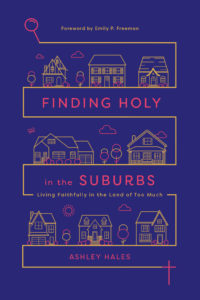 Finding Holy in the Suburbs: Living Faithfully in the Land of Too Much Ashley Hales IVP) $16.00 Anyone who has heard any of the conversations about James K.A. Smith’s You Are What You Love (a nice one-volume summary of his bigger “cultural liturgy” trilogy) or the wonderful book by Tish Warren (Liturgy of the Ordinary) you will immediately resonate with a book that says, in bold type on the back, “Places Form Our Loves.” That is, the ordinary, daily stuff of our material lives, our comings and goings, form in us habits and consequently values and dispositions, which reinforce a certain kind of living, a lifestyle. For better or worse, we are what we love and our loves, our desires, our imaginations of the good life, the stories we’ve been conscripted into, inform and shape our daily life. And our view of discipleship and service and church and God. All this stuff — our views of faith and life — are what the scholars call pre-theoretical. Our hearts, informed by stories and actual landscapes, shape our minds. We don’t “think” our way to holiness, as I’ve heard Smith say.
Finding Holy in the Suburbs: Living Faithfully in the Land of Too Much Ashley Hales IVP) $16.00 Anyone who has heard any of the conversations about James K.A. Smith’s You Are What You Love (a nice one-volume summary of his bigger “cultural liturgy” trilogy) or the wonderful book by Tish Warren (Liturgy of the Ordinary) you will immediately resonate with a book that says, in bold type on the back, “Places Form Our Loves.” That is, the ordinary, daily stuff of our material lives, our comings and goings, form in us habits and consequently values and dispositions, which reinforce a certain kind of living, a lifestyle. For better or worse, we are what we love and our loves, our desires, our imaginations of the good life, the stories we’ve been conscripted into, inform and shape our daily life. And our view of discipleship and service and church and God. All this stuff — our views of faith and life — are what the scholars call pre-theoretical. Our hearts, informed by stories and actual landscapes, shape our minds. We don’t “think” our way to holiness, as I’ve heard Smith say.
So. Given all this — Smith tells how the world’s values shape our desires by the cultural liturgies we imbibe and Warren shows how worship liturgies in her church help her find God in the ordinary stuff of daily life — how does Ashely Hales fit in? Why recall all this wordy backstory?
Well, Hales herself rehearses just a bit of this and one can see that she’s done good homework in thinking deeply about the sociology of our times, how hearts and habits work, how somehow the places we find ourselves shape us. She is wiser than most and careful about her consideration of her themes. As one reviewer put it, her writing is fierce, but has another put it, she writes with “poignant clarity.”
And she has a sense of wit about it since she did a few promo videos about this book from inside her Southern California min-van. Ha.
What do tract homes, strip malls, commuter culture and what Joni Mitchell called “The Hissing of Summer Lawns” have to do with our desire for God’s holiness in our lives? How do we see God’s ways — including solidarity with the poor and being agents of a multi-ethnic Kingdom — when one lives in the suburbs? How does this space — literally, the built environment, the culture of habits and lifestyles — effect our interior lives and our public discipleship? Hales helps us explore all of this and more. And did I say she does it with grace and wit?
She is a mother of four and a pastor’s wife. She has a PhD in English ffrom Edinburgh, so she’s no simple armchair critic. It is pretty easy for cynical hipsters or old-time hippies or Wendell Berry-esque back to the landers or even what David Brooks calls BOBOs (“bourgeois bohemians”) to criticize the bland if busy suburbs. Tons of films righteously mock the alleged emptiness of the ‘burbs. I love the hyper-critical James Howard Kunstler (you have to read The Geography of Nowhere and Home from Nowhere) but I’m glad to see an evangelical author writing about holiness start with the headline, “A Story To Find Home in the Geography of Nowhere.”
Can we do that, find true home in this odd sort of placeless place? And if so, what does holiness and healthy spirituality look like in this “land of too much”?
(And might it connect to the really heavy themes presented in one of my favorite books Beyond Homelessness: Christian Faith in a Culture of Displacement by Brian Walsh & Steven Bouma-Prediger which explores how some people, even of those of great means, may have houses but not homes.)
Ashely Hales is a fine guide into these questions and any book that gets us thinking in these ways is deserving of a ‘burg-sized award. Her chapter titles are exceptionally interesting. Her footnotes are extraordinary — she quotes Scott Russel Saunders’ Staying Put and Marlena Graves’ A Beautiful Disaster and that great book by Sarah Arthur and Erin Wasinger called The Year of Small Things and Andy Crouch’s Strong and Weak and Jen Pollock Michel’s Keeping Place. She deserves another award just for that. She has a fine eye for detail in a well told story and she obviously knows some of the best Christian writers with whom she is in dialogue. The result is a feast of a book, helpful, wise, challenging, inspiring. It is one of my favorite books fo 2018.
Hales isn’t the first to write from a Christian perspective about this incarnational sense of place in the ‘burbs. Over ten years ago Dave Goeetz (who has a lovely blurb on the back) wrote Death By Suburb: How to Keep the Suburbs from Killing Your Soul and Albert Hsu wrote the very good The Suburban Christian: Finding Spiritual Vitality in the Land of Plenty. They are both valuable and we recommend them, but this new one by Hales is by far the best evangelical book yet about this world of SUVs and soccer moms, of back decks and cul-de-sacs, of granite countertops and gated communities. And through it all she invites us to reflect on our own brokenness, to find healing and hope wherever we find ourselves, to seek God’s holiness and serve Christ’s kingdom of justice and reconciliation. As Seth Haines put it, “Ashley is the rare sort of writer, imaginative yet concrete, prophetic yet gentle. She only cuts where she can bring healing.” This is a very interesting little book.
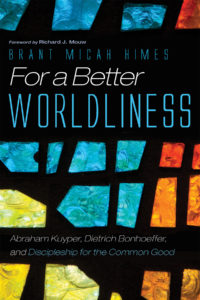 For a Better World: Abraham Kuyper, Dietrich Bonhoeffer, and Discipleship for the Common Good Brant Micah Himes (Pickwick Publications) $28.00 I just grinned when I saw this, got so excited, because many folks know Bonhoeffer but fewer know the Dutch theologian, journalist, politician, educator who lead a revival in late 1800s Holland under the banner of the Lordship of Christ over all of life and creating a pluralistic culture where all worldviews are treated fairly. His piety and justice and structural (“archetectonic” some say) drove this giant of a man, and yet few know him. We can be glad for Brant Himes (a Humanities prof at Azusa Pacific and a managing editor for the theological journal Resonance) for pulling of this judicious study. Ken Wytsma (of the Justice Conferences) says For a Better Worldliness “is one of the most intriguing books I’ve run across in a long time.”
For a Better World: Abraham Kuyper, Dietrich Bonhoeffer, and Discipleship for the Common Good Brant Micah Himes (Pickwick Publications) $28.00 I just grinned when I saw this, got so excited, because many folks know Bonhoeffer but fewer know the Dutch theologian, journalist, politician, educator who lead a revival in late 1800s Holland under the banner of the Lordship of Christ over all of life and creating a pluralistic culture where all worldviews are treated fairly. His piety and justice and structural (“archetectonic” some say) drove this giant of a man, and yet few know him. We can be glad for Brant Himes (a Humanities prof at Azusa Pacific and a managing editor for the theological journal Resonance) for pulling of this judicious study. Ken Wytsma (of the Justice Conferences) says For a Better Worldliness “is one of the most intriguing books I’ve run across in a long time.”
Rich Mouw wrote a lovely introduction reminding us that the very word “discipleship” means different things to different folks (and Kuyper didn’t use the word much, as such) so Hime’s helps us all learn a bit more about what the word might entail and what disciple may mean — along the way we all learn about following Jesus, about public life, about the common good. Kuyper served as Prime Minister of the Netherlands and Bonhoeffer famously inhabited a dank prison cell, so they led very different lives, on different sides of the experience of power and prestige. (Both visited America, by the way: Kuyper was hosted a the White House and then travelled among Dutch immigrant communities after lecturing at Princeton and Bonhoeffer studied in New York but worshiped in a black church in Harlem, which was pivotal for him.)
For anyone interested in how devout faith, learned theology, and a robust understanding of public life can effect our discipleship, this rare is well worth working through. For those of us who are fans of either Kuyper on Bonhoeffer, it is a must.
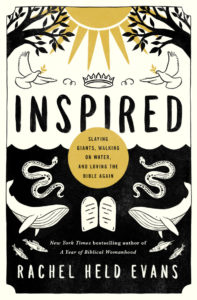 Inspired: Slaying Giants, Walking on Water, And Loving the Bible Again RachelHeld Evans (Thomas Nelson) $16.99 I loved this book for a bunch of reasons and knew that I’d want to recommend it to those who want a good read about a woman coping with the difficulties in the Bible, the violence and genocide and brutality and confusion. She was raised as a super-duper evangelical, was a leader in her youth ministry, a witness in her high school, and happily enjoyed the Bible that was such a big part of her families life. As she grew into different phases of how she used the Bible, things slowly eroded until in her twenties she became disillusioned and frustrated. She has told some of this story elsewhere and she tells it well. For anyone interested in faith development (or re-development) her stories about leaving fundamentalism, about coping with the Bibles teachings about women, about finding a church more suited to her longings, her several books will provide insight and solace. And they are interesting and funny.
Inspired: Slaying Giants, Walking on Water, And Loving the Bible Again RachelHeld Evans (Thomas Nelson) $16.99 I loved this book for a bunch of reasons and knew that I’d want to recommend it to those who want a good read about a woman coping with the difficulties in the Bible, the violence and genocide and brutality and confusion. She was raised as a super-duper evangelical, was a leader in her youth ministry, a witness in her high school, and happily enjoyed the Bible that was such a big part of her families life. As she grew into different phases of how she used the Bible, things slowly eroded until in her twenties she became disillusioned and frustrated. She has told some of this story elsewhere and she tells it well. For anyone interested in faith development (or re-development) her stories about leaving fundamentalism, about coping with the Bibles teachings about women, about finding a church more suited to her longings, her several books will provide insight and solace. And they are interesting and funny.
But we must ask — she her self asks — where is this all heading? What do we do with the Bible even if we try to read it in a less legalistic manner, if we become friends with helpful critics (such as, say, Pete Enns, whose own works have influenced Rachel a bit.) What if we love the stories and still want to hear God’s voice through them?
She is haunted by God, loves the Bible, can’t get away from her sense that it is deeply true and has a claim on her. How do you fall in love with the Bible after you’ve deconstructed and maybe discarded some of it?
Inspired is the inspired story of her journey back to loving the Bible again. She has some clever and creative paraphrases of a few sections of Scripture that some will love. She shares plenty of memoir-ish narrations, stories about her own ups and downs and those of us who like that kind of reflective auto-biographical writing will love it. And then there is the heart of the book — nicely and honestly written, weaving between Biblical exegesis, Biblical storytelling and memoir — where Evans explores various themes within the Holy Book. These have chapter headings such as Origin Stories, Deliverance Stories, War Stories, Wisdom Stories, Resistance Stories, Gospel Stories, Fish Stories, and Church Stories. There are all very, very interesting and really helpful, especially for those needing some handles on how to properly appreciate what is going on in the text — no, what is really going on.
You can decide if it is adequately faithful, if her comments bear good fruit. She does not disguise her anguish about some of the awful stuff, and for that we should all be glad — this is, finally, I think, respectful to God’s Word, taking it seriously. If one is not troubled by some of the stuff we see in the Bible, there is something wrong with us, she says, and I think she is on to something. But, agree or not with every comment, snarky or earnest, pained or joyful, critical or grateful, there is a lot here for anyone who loves the Scriptures and loves to hear how other people understand them. This was one of my favorite books of the year.
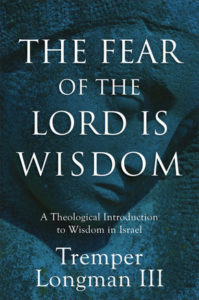 The Fear of the Lord Is Wisdom: A Theological Introduction to Wisdom in Israel Tremper Longman III (BakerAcademic) $32.99 Tremper Longman is one of those scholars who can write popular level guides like How to Read Proverbs and partner with his psychologist pal Dan Allender offering sturdy Biblical content for titles like God Loves Sex. And then he does these books that, for another scholar, might be an admirable life’s work. That Longman has other such major works is remarkable and this one, surely, deserves accolades for one of the best books in the field of Old Testament studies published this past year.
The Fear of the Lord Is Wisdom: A Theological Introduction to Wisdom in Israel Tremper Longman III (BakerAcademic) $32.99 Tremper Longman is one of those scholars who can write popular level guides like How to Read Proverbs and partner with his psychologist pal Dan Allender offering sturdy Biblical content for titles like God Loves Sex. And then he does these books that, for another scholar, might be an admirable life’s work. That Longman has other such major works is remarkable and this one, surely, deserves accolades for one of the best books in the field of Old Testament studies published this past year.
This book is comprehensive, readable, smart and faithful. He examines both cultural and canonical evidence to show wisdom’s enduring theological significance. In our postmodern time, he observes, this is particularly valuable and it is an urgent task to recover a sense of Biblical wisdom as a theological category. My deeper interest was piqued in the preface when he suggests that he (unlike authors I appreciate like William Brown, for instance) doesn’t think it is helpful to designate a certain genre of OT writings as “wisdom” literature as such. Wow. It is, to put in more simply than I should, less a literary genre and more of a theological virtue. Which is to say you find wisdom in places other than Proverbs and Ecclesiastes.
Others rave, too, so I think I’m on solid ground award this; scholars like Carol Kaminski say it is written with “masterful elegance” and John Goldingay says Longman’s book is “balanced and informative.” This demands to be placed on your bookshelf next to Old Testament Wisdom Literature the grand book by Craig Bartholomew and Ryan O’Dowd. Highly recommended.
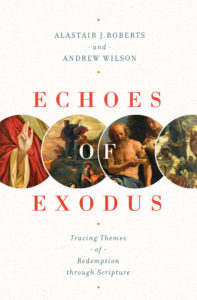 Echoes of Exodus: Tracing Themes of Redemption Through Scripture Alastair Roberts & Andrew Wilson (Crossway) $17.99 I am always on the look-out for books that are rooted in serious scholarship but are not aimed at the academic guild. I am always on the look-out for books that help Bible readers, Sunday school classes, Bible study groups, preachers and teachers see the inter-connection between Old and New Testaments, using what some call the “historical redemptive” method of capturing not just the echoes and allusions between texts but in themes and motifs as the Biblical drama unfolds in a series of promises and fulfillments. This little book, by authors with PhDs from prestigious places, who are hip podcasters and clever writers, offers a serious-minded, warm-hearted exploration of how the exodus story not only stands as a pivotal event in the Old Testament but as a rich source for talking about redemption throughout the whole Bible. As such, it is one of the best books of its kind this year.
Echoes of Exodus: Tracing Themes of Redemption Through Scripture Alastair Roberts & Andrew Wilson (Crossway) $17.99 I am always on the look-out for books that are rooted in serious scholarship but are not aimed at the academic guild. I am always on the look-out for books that help Bible readers, Sunday school classes, Bible study groups, preachers and teachers see the inter-connection between Old and New Testaments, using what some call the “historical redemptive” method of capturing not just the echoes and allusions between texts but in themes and motifs as the Biblical drama unfolds in a series of promises and fulfillments. This little book, by authors with PhDs from prestigious places, who are hip podcasters and clever writers, offers a serious-minded, warm-hearted exploration of how the exodus story not only stands as a pivotal event in the Old Testament but as a rich source for talking about redemption throughout the whole Bible. As such, it is one of the best books of its kind this year.
Here is how it says it on the back cover:
Using music as a metaphor, the authors point us to the recurring theme of the exodus throughout the entire symphony of Scripture, shedding light on the Bible’s unified message of salvation and restoration that is at the heart of God’s plan for the world.
Besides this big picture of the nature of the liberation God is bringing and how there are “echoes of exodus” all over the place in the Bible, there are “review questions” and “thought questions” after each chapter, making this a great little study for small groups. I like the blurb by Matthew Harmon, a New Testament prof at Grace College and Theological Seminary who says:
The blend of rich biblical theology and beautiful writing will stir the affections of all who long for the Promised Land of the new heaven and new earth.
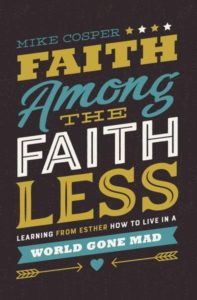 Faith Among the Faithless: Learning from Esther How to Live in a World Gone Mad Mike Cosper (Thomas Nelson) $16.99 Again, we wrote about this previously at BookNotes and raved about it for being so very interesting and applicable, a fascinating study of Christian cultural engagement based on this one provocative Bible story. I want to honor this because I like Cosper’s writing (his Rhythms of Grace is a great book on worship; Stories We Tell is a great study of movies and TV, and Recapturing the Wonder is a brilliant study of disenchantment, secularization, and the joy of curiosity as we wonder in awe at the God-drenched universe.) So when this guy directs us to a new model of faithful cultural engagement, I want to list. And wow, what a thesis: he gently pokes are often-used story of Daniel in Babylon as a model and, for reasons you will learn as you read Faith Among the Faithless, he suggests that Esther is perhaps a more fruitful model of faith in a secular age. Of course we all want to live without compromise in an increasingly hostile society. Some o f us have already given in to that society’s vision and values. Sound familiar? Of course, it’s all there in that book of the Bible that does not mention God’s name, that story of sex, ego, revenge. Agree or not with all of his views or his adaptation of the story for today, but this deserves to be known as an award-winning study for its creative and intentional application. Even in dark times God may be hidden but, Cosper assures, us, God is never absent.
Faith Among the Faithless: Learning from Esther How to Live in a World Gone Mad Mike Cosper (Thomas Nelson) $16.99 Again, we wrote about this previously at BookNotes and raved about it for being so very interesting and applicable, a fascinating study of Christian cultural engagement based on this one provocative Bible story. I want to honor this because I like Cosper’s writing (his Rhythms of Grace is a great book on worship; Stories We Tell is a great study of movies and TV, and Recapturing the Wonder is a brilliant study of disenchantment, secularization, and the joy of curiosity as we wonder in awe at the God-drenched universe.) So when this guy directs us to a new model of faithful cultural engagement, I want to list. And wow, what a thesis: he gently pokes are often-used story of Daniel in Babylon as a model and, for reasons you will learn as you read Faith Among the Faithless, he suggests that Esther is perhaps a more fruitful model of faith in a secular age. Of course we all want to live without compromise in an increasingly hostile society. Some o f us have already given in to that society’s vision and values. Sound familiar? Of course, it’s all there in that book of the Bible that does not mention God’s name, that story of sex, ego, revenge. Agree or not with all of his views or his adaptation of the story for today, but this deserves to be known as an award-winning study for its creative and intentional application. Even in dark times God may be hidden but, Cosper assures, us, God is never absent.
Kyle Idleman says “Esther has the guts and grit that we all need to bend the times to Christ.” Karen Swallow Prior says, “It’s been a long time since I have been so informed, inspired, and encouraged.” Yep. Faith Among the Faithless is one of my favorite books of 2018.
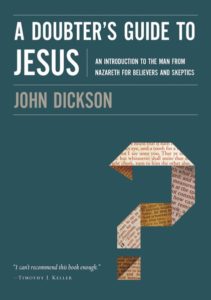 A Doubter’s Guide to Jesus: An Introduction to the Man from Nazareth for Believers and Skeptics John Dickson (Zondervan) $16.99 This compact sized paperback came out early last year and took it’s place beside The Doubter’s Guide to the Bible and the Doubter’s Guide to the Ten Commandments. Something a bit more than the famous Oxford University Press “Very Short Introductions” but still concise enough for one who doesn’t want to wade through hundreds of pages of footnotes, these Doubter’s Guides are exception introductions to the topics they approach. And this one stands out as simply stellar. The quote on the front by Tim Keller gives a clue who exclaims, “I can’t recommend this book enough.” Another good friend and customer of ours, one who buys a lot of books and reads a lot of books, similarly couldn’t stop talking about it and recommending it to those at his church. Which inspired me to not just recommend it but to consider placing it on our Best of 2018 list.
A Doubter’s Guide to Jesus: An Introduction to the Man from Nazareth for Believers and Skeptics John Dickson (Zondervan) $16.99 This compact sized paperback came out early last year and took it’s place beside The Doubter’s Guide to the Bible and the Doubter’s Guide to the Ten Commandments. Something a bit more than the famous Oxford University Press “Very Short Introductions” but still concise enough for one who doesn’t want to wade through hundreds of pages of footnotes, these Doubter’s Guides are exception introductions to the topics they approach. And this one stands out as simply stellar. The quote on the front by Tim Keller gives a clue who exclaims, “I can’t recommend this book enough.” Another good friend and customer of ours, one who buys a lot of books and reads a lot of books, similarly couldn’t stop talking about it and recommending it to those at his church. Which inspired me to not just recommend it but to consider placing it on our Best of 2018 list.
Dickson is fluent in the life of Jesus and the way that Christ places Himself at the center of the Hebrew redemptive narrative; as a scholar he knows all kinds of pertinent books and shares them nicely. It is almost worth getting this little gem to see the sidebars and boxes with recommend book lists in them. It is warm and thoughtful and interesting. Three cheers!
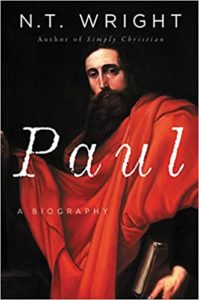 Paul: A Biography N.T. Wright (HarperOne) $29.99 Oh my, I hope you recall our big announcement of this when it came out earlier this year. It is, yes, by one of the great New Testament scholars of our time, whose two volume work Paul and the Faithfulness of God weighs in at over 1700 pages! The guy who then wrote another hefty book about all the various scholars on Paul these days called Paul and His Recent Interpreters and then quickly did a clarifying book for those that wanted key questions answered about his views on a handful of key interpretive quandaries in Pauline research — named, naturally, The Paul Debate: Critical Questions for Understanding the Apostle. And this is just his recent work on Paul.
Paul: A Biography N.T. Wright (HarperOne) $29.99 Oh my, I hope you recall our big announcement of this when it came out earlier this year. It is, yes, by one of the great New Testament scholars of our time, whose two volume work Paul and the Faithfulness of God weighs in at over 1700 pages! The guy who then wrote another hefty book about all the various scholars on Paul these days called Paul and His Recent Interpreters and then quickly did a clarifying book for those that wanted key questions answered about his views on a handful of key interpretive quandaries in Pauline research — named, naturally, The Paul Debate: Critical Questions for Understanding the Apostle. And this is just his recent work on Paul.
Well, through it all, Tom has been pondering and praying and reading and discussing (not to mention going to the very places Paul went throughout the Mediterranean) and has now gifted us with this, a novel-esque, wonderfully engaging introduction to Paul’s thought by way of telling of his life. This is a captivating, thick, fabulously informative and well-written bio, the intro to Paul we’ve been waiting for. Kudos to Wright for getting this right. As Ben Witherington (who himself has written bunches of significant, big books on Paul) says, it is “written with the usual Wright combination of erudition, intuition, and mature wit and wisdom.” As world-class Rabbi Lord Jonathan Sacks writes, it is “an enthralling journey into the mind of Paul by one of the great theologians of our time.”
I hope you agree this should be in every church library, circulated widely, read and discussed, and enjoyed, if not out and out celebrated. We are honoring it as one of the very best books of the year!
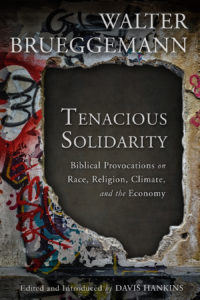 Tenacious Solidary: Biblical Provocations on Race, Religion, Climate, and the Economy Walter Brueggemann; edited and introduced by Davis Hankins (Fortress Press) $29.00 This is the most hefty and substantial book by Walt Brueggemann in quite a few years; his recent output has been rich and prolific, but has included a short Lenten devotional, an even shorter Advent devotional, an succinct (if powerful) adult resource on speaking up, a small book about the conflict in the Holy Land, that brief, potent book on sabbath, and a few shorter collections of academic pieces. Gospel of Hope is a splendid small hardback collection of short excerpts, sayings, quotations, gathering Brueggemann’s wisdom on topics ranging from anxiety and abundance to partisanship and the role of faith in public life, best used to dip into and ponder or when one needs a good quote or short reading.
Tenacious Solidary: Biblical Provocations on Race, Religion, Climate, and the Economy Walter Brueggemann; edited and introduced by Davis Hankins (Fortress Press) $29.00 This is the most hefty and substantial book by Walt Brueggemann in quite a few years; his recent output has been rich and prolific, but has included a short Lenten devotional, an even shorter Advent devotional, an succinct (if powerful) adult resource on speaking up, a small book about the conflict in the Holy Land, that brief, potent book on sabbath, and a few shorter collections of academic pieces. Gospel of Hope is a splendid small hardback collection of short excerpts, sayings, quotations, gathering Brueggemann’s wisdom on topics ranging from anxiety and abundance to partisanship and the role of faith in public life, best used to dip into and ponder or when one needs a good quote or short reading.
(And, by the way, he has a potent new book that was just released, perhaps a bit surprising, about hymns called A Glad Obedience: Why and What We Sing. I’ll be telling you more about that soon, for sure.)
But this big, new volume (over 450 pages) is a major collection of daring sermons, powerful talks, important lectures, Bibles studies and articles that have appeared in recent years — I said he was prolific — all about how the Bible might authorize us to be prophetic and critical about how things are in our world, inviting us to think, as he sometimes puts, it “otherwise.” As Jim Wallis says, “Tenacious Solidarity is a godsend.” This is the sort of creative and thick and serious Bible awareness we need to fund a new imagination that will enable us to face these pressing demands of our time as God would wish.
Here Brueggemann offers an ethic for Biblical people informed by generosity, justice, mercy, and trust in the untamed God of mysterious abundance. He is, as always, remarkably well-read, tossing off citations from the social sciences and great literature and historians and activists and old theologians alongside the most promiscuous use of the Bible you can image. This guy know his Scriptures and draws connections and interconnections as if it were his native tongue — which, after all these it, it is. No wonder he is so raw and insistent and seemingly strange and deeply relevant at the same time. Tenacious Solidarity is one of the great books of the year. It includes 20 strong pieces, a great and informative introduction and a few appendices.
Christine Yoder of Columbia Theological Seminary writes that this book illustrates Walt’s “characteristic skill and wisdom” and demonstrates “the generative and transformative potentials of biblical texts to name and confront urgent challenges of our time.” Amen.
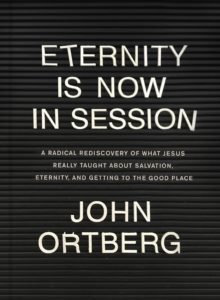 Eternity Is Now in Session: A Radical Rediscovery of What Jesus Really Taught About Salvation, Eternity, and Getting to the Good Place John Ortberg (Tyndale) $17.99 I like John Ortberg; he is well informed, thoughtful, but a masterful communicator. Whether he is sharing what he’s learned from Dallas Willard or summing up complicated arguments from N.T. Wright or, as in The Life You Always Wanted explaining what we mean by spiritual disciplines, he popularizes the best stuff in compelling, entertaining, and helpful ways. This is basic Christian growth material made clear and practical and inspiring. Many loved his last book, another on the interior life inspired by Willard called Soul Keeping: Caring for the Most Important Part of You and the one before that was a fabulous, fabulous introduction to why everybody should study Jesus (Who Is This Man?) He is a vital pastor, and great teacher, and this new one deserves special acclaim. Its a favorite of ours this year.
Eternity Is Now in Session: A Radical Rediscovery of What Jesus Really Taught About Salvation, Eternity, and Getting to the Good Place John Ortberg (Tyndale) $17.99 I like John Ortberg; he is well informed, thoughtful, but a masterful communicator. Whether he is sharing what he’s learned from Dallas Willard or summing up complicated arguments from N.T. Wright or, as in The Life You Always Wanted explaining what we mean by spiritual disciplines, he popularizes the best stuff in compelling, entertaining, and helpful ways. This is basic Christian growth material made clear and practical and inspiring. Many loved his last book, another on the interior life inspired by Willard called Soul Keeping: Caring for the Most Important Part of You and the one before that was a fabulous, fabulous introduction to why everybody should study Jesus (Who Is This Man?) He is a vital pastor, and great teacher, and this new one deserves special acclaim. Its a favorite of ours this year.
It is current in that he is studying heaven (the opening page has a spoiler about “The Good Place” TV show) and reminds us that our view of the afterlife is important, but only part of what the gospel is about. In fact, if we understand the theme of the Kingdom of God — the heart of Jesus’s teachings and proclamation, after all — we’ll understand that “Eternity Is Now in Session.”
Yes, yes, yes. I love this easy to read book and think his telling about bringing “up there” “down here” is just so useful for most church folks. What if we stopped thinking about eternal life as something we experience after we die, if we stopped think about getting into heaven but about heaven getting into us, we’d change the calibre of our faith and the tone of our churches. And perhaps we’d become more astute about being Kingdom ambassadors in all of life. We’d become people who are alive in our knowledge of God and our piety would spill out in healthy and exciting ways.
Truly, this is “a radical rediscovery of the Christian concept of salvation.” And let me tell you — this is fun and interesting, but the Langston Hughe’s story he tells near the beginning will not quickly be forgotten. And his little illustration about dancing in the last few pages will inspire you to move, to let God’s grace spill over you and allow you to dance with the Lord of the Dance! What a book!
As we’ve said before, there is a DVD curriculum to go with this as well which we also have. Give us a call if you’re interested.
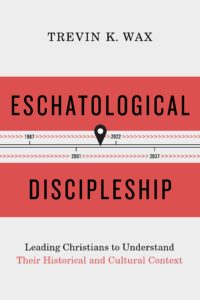 to Understand Their Historical and Cultural Context Trevin K. Wax (B&H Academic) $29.99 I used to play off of the Awards Show schtick and offer specific awards for some books. If I were doing this I’d put this as a contender for, at least, the trophy for the most intriguing theological book title. Oh, there’s some wacky ones out there and theological textbooks can enter the realm of the arcane pretty quickly. But this; it makes sense. There are, you may know, reputable scholars who find apocalyptic themes in most of the Kingdom language of Jesus and insist He is revealing a new order in the middle of real life, an upside down Kingdom that will soon be consummated. When will all things be made new? Well, that’s the eschatological question, isn’t it? And so, without any weird rapture charts or end-times scenarios, Wax here is saying that, at least, we are to live now as if we are in rehearsal for eternity. “People get ready,” the old Curtis Mayfield song sang. As Kevin Vanhoozer puts it, “Wax convincingly sets out the biblical basis for ‘eschatological discipleship’, which means the importance of waking up (and staying awake) to the reality that our citizenship in heaven begins now.
to Understand Their Historical and Cultural Context Trevin K. Wax (B&H Academic) $29.99 I used to play off of the Awards Show schtick and offer specific awards for some books. If I were doing this I’d put this as a contender for, at least, the trophy for the most intriguing theological book title. Oh, there’s some wacky ones out there and theological textbooks can enter the realm of the arcane pretty quickly. But this; it makes sense. There are, you may know, reputable scholars who find apocalyptic themes in most of the Kingdom language of Jesus and insist He is revealing a new order in the middle of real life, an upside down Kingdom that will soon be consummated. When will all things be made new? Well, that’s the eschatological question, isn’t it? And so, without any weird rapture charts or end-times scenarios, Wax here is saying that, at least, we are to live now as if we are in rehearsal for eternity. “People get ready,” the old Curtis Mayfield song sang. As Kevin Vanhoozer puts it, “Wax convincingly sets out the biblical basis for ‘eschatological discipleship’, which means the importance of waking up (and staying awake) to the reality that our citizenship in heaven begins now.
In a way, this is a much more scholarly and meaty treatment of the basic teaching Ortberg makes in his lovely Eternity Is Now in Session [see above.]Wax calls it eschatological discipleship, we live now as if the future that we anticipate is breaking in now, already but not yet. Get it?
His first chapter shows that he is conversant in some of the best stuff on worldview formation and thinking Christianly about whole-life, fully human sorts of public discipleship. He quotes Al Wolters and Sander Griffion, he cites journal articles by serious thinkers in this tradition of worlldviewish discipleship from across the theological spectrum, from Nancy Pearcey to Brian Walsh to N.T. Wright, not to mention philosophers such as Charles Taylor cultural critics like James Smith and Skye Janthani.
Here is how one of my favorite missional worldview scholars, Michael Goheen, puts it:
It is not a matter of whether eschatology will shape the church’s life but only a matter of which one. Discipleship, a burning need in the syncretistic American church, surely needs to be re-envisioned in terms of equipping God’s people to more and more live out of a biblical eschatology of the kingdom. In this book Trevin Wax takes up this challenge and encounters the two most powerful rival eschatologies of our day–the Enlightenment notion of progress and Consumerism. I pray that God will use this book to enable the American church to reimagine discipleship in its missionary setting.
I think maybe we should have an award for the book that inspires the most insightful endorsing blurbs. Many passionate memoirs and novels certainly generate over the top, gripping, eloquent raves. But for a non-fiction book that needs nicely summarized, this quote by Mike Goheen is itself worth pondering. Read that quote again and tell me this doesn’t seem like a vital, urgent book.
Eschatological Discipleship is perhaps a bit more academic sequel to, or maybe a theological foundation for Wax’s 2017 book This Is Our Time: Everyday Myths in Light of the Gospel (B&H; $16.99.) Agree or not with all of his cultural criticism, this is a great example of trying to be faithfully “in but not of” the world around us, living well into what Niebuhr called “Christian transforming culture.” Check it out.
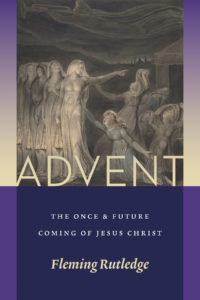 Advent: The Once and Future Coming of Jesus Christ Fleming Rutledge (Eerdmans) $30.00 This book is nothing short of extraordinary and was perhaps our favorite book to sell this past year. And it was one of our best sellers — thank you, Amazon, for running out, and thank you, dear Fleming, for saying such nice things about us on line. It certainly deserved to be a Hearts & Minds bestseller and deserves to be widely read; there is no other book like it. Who, these days, doesn’t at least try to attend to the spiritual disciplines and theological tone of the season of Advent, inviting us, as it does, to wait, to anticipate, to long for the final restoration of creation when Christ comes the second time?
Advent: The Once and Future Coming of Jesus Christ Fleming Rutledge (Eerdmans) $30.00 This book is nothing short of extraordinary and was perhaps our favorite book to sell this past year. And it was one of our best sellers — thank you, Amazon, for running out, and thank you, dear Fleming, for saying such nice things about us on line. It certainly deserved to be a Hearts & Minds bestseller and deserves to be widely read; there is no other book like it. Who, these days, doesn’t at least try to attend to the spiritual disciplines and theological tone of the season of Advent, inviting us, as it does, to wait, to anticipate, to long for the final restoration of creation when Christ comes the second time?
Advent: The Once and Future Coming… is nearly a life-time’s worth of Advent sermons preached by the thoughtful and eloquent Episcopal pastor-theologian/preacher extraordinaire who is eloquent about the hard tensions of living “between the times”of the Kingdom come and the Kingdom consummated. Episcopalians do Advent better than most of us and Rev. Rutledge’s sermons — like “Advent Begins in the Dark” — explore the theme with remarkable insight and many lovely illustrations and anecdotes. (She is the author, recall, of another collection of sermons called The Gospel and the New York Times.) I often say that her thick volume The Undoing of Death is my favorite book to read from during Lent. This new Advent work is without a doubt is a book I will cherish for the rest of my life. Highly recommended as one of the most significant religious publishing releases of 2018.
By the way, we’ve announced it previously but you should know that her handsome, compact sized hardback, Three Hours: Sermons for Good Friday (Eerdmans; $18.00) is now here. I have intentionally not dipped in yet, but am eager to read these sermons in due time. You should, too.
 Hostility to Hospitality: Spirituality and Professional Socialization Within Medicine Michael J. Balboni & Tracy A. Balboni (Oxford University Press) $35.95 As you know, we here at Hearts & Minds are passionate about providing books about relating faith and deeply Christian principles and values to various work spheres. If any job done before God and for the sake of Christ’s Kingdom can be a holy calling, if we all need what Steve Garber calls “visions of vocation” then we also need to ask the tough question: what does it mean to think and act faithfully, appropriately, Christianly, consonant with how God made the world and how Christ is redeeming it, in my specific job. There are a lot of books these days about a Christian view of work, about how all followers of Christ have a missional calling to carry their faith into the marketplace, to be artists or scientists or home-makers or teachers for the common good, loving God and neighbor in the very way we practice those careers and calling. Got it? Sure you do.
Hostility to Hospitality: Spirituality and Professional Socialization Within Medicine Michael J. Balboni & Tracy A. Balboni (Oxford University Press) $35.95 As you know, we here at Hearts & Minds are passionate about providing books about relating faith and deeply Christian principles and values to various work spheres. If any job done before God and for the sake of Christ’s Kingdom can be a holy calling, if we all need what Steve Garber calls “visions of vocation” then we also need to ask the tough question: what does it mean to think and act faithfully, appropriately, Christianly, consonant with how God made the world and how Christ is redeeming it, in my specific job. There are a lot of books these days about a Christian view of work, about how all followers of Christ have a missional calling to carry their faith into the marketplace, to be artists or scientists or home-makers or teachers for the common good, loving God and neighbor in the very way we practice those careers and calling. Got it? Sure you do.
But yet, there still isn’t enough fresh, thoughtful stuff coming out on various careers, thinking well and studying various jobs and callings. So, we want to honor this book and all that it signifies as a keen example of a major Christian project, scholarly and applicable, for those in health care, published on a mainstream academic press. That is, this is a major contribution to the field of medicine and it is asking, for the profession, what role spiritual things play in the practice of medicine, This is a book of practical Christian thinking about health and healing about medicine and health care, about doctoring and nursing and teaching medicine and, well, about being sick and being a patient, too. It is asking — with a heavy bit of research backing up their quest, and serious finding which they share — if there is a way in which American medicine distances itself form religion and spirituality. The “secular-sacred divide” that they write about “unleashes depersonalizing social forces through the market, technology, and legal-bureaucratic powers that reduce clinicians to tiny cogs in an unstoppable machine.” Wow.
As it says right on the back cover, “the authors argue for structural pluralism as the missing piece to changing hostility to hospitality.” Again, wow. This is an award winning thesis if I ever saw one and want to celebrate that somebody is thinking like this, doing this kind of work, putting together such a substantive collection of essays and binding them together within a world-famous publishing house. Let those with ears, hear. Kudos to Michael and Tracy Balboni.
Michael J. Balboni, PhD is on faculty at Harvard University and a theologian-in-residence in the Department of Psychiatry, Brigham & Women’s Hospital, Boston. His social science research has centered on the intersection of spirituality and medicine. He serves as a congregational minister at Park Street Church and the Longwood Christian Community.Tracy A. Balboni, MD is an Associate Professor at Harvard Medical School and serves as the Clinical Director of the Supportive and Palliative Radiation Oncology Service at Dana-Farber Cancer Institute and Brigham & Women’s Hospital. She is an internationally recognized leader and researcher at the intersection of spirituality, palliative care, and oncology.
 Pure: Inside the Evangelical Movement That Shamed a Generation of Young Women and How I Broke Free Linda Kay Klein (Touchstone) $26.00 A few years ago we had a category in our end of the year awards for books “I loved to hate” which were, obviously, really bad books. Then I’d sometimes give an award for a work I “hated to love.” This would be one of those, a book with which I have grave concerns, strong disagreements, and yet really, really loved. Although “loved” is not quite the right word. It was moving, fascinating, insightful, provocative, entertaining, horrific, important, sad, and, occasionally funny.
Pure: Inside the Evangelical Movement That Shamed a Generation of Young Women and How I Broke Free Linda Kay Klein (Touchstone) $26.00 A few years ago we had a category in our end of the year awards for books “I loved to hate” which were, obviously, really bad books. Then I’d sometimes give an award for a work I “hated to love.” This would be one of those, a book with which I have grave concerns, strong disagreements, and yet really, really loved. Although “loved” is not quite the right word. It was moving, fascinating, insightful, provocative, entertaining, horrific, important, sad, and, occasionally funny.
First, I don’t like the title — a whole “generation” of women were not shamed by the purity thing, and the alarmist nature of the subtitle — “breaking free” — makes the author’s journey out of conservative evangelicalism sound more sensational than it is. Her journey is poignant and painful but she wasn’t in a cult and her parents were not like, say, Tara Westover’s.
Still, apparently, a whole, whole lot of young people, especially young women, were shamed and worse by the evangelical purity movement and it is regrettable. This moving book — part memoir and part oral history and sociology — wants those to who have been through this sub-culture to know they are not alone.
It further insists that we who remain in the evangelical sub-culture re-think our attitudes, theologies, and educational practices around sex ed. Like the brand new, controversial Nadia Bolz-Weber book, Shameless: A Sexual Reformation, this book, like it or not, reminds us that even well-intended efforts at teaching holiness can become deeply harmful. (See Lauren Winner’s book on “characteristic” sin, The Dangers of Christian Practice, mentioned above.)
Many of those who so loudly encouraged sexual purity made a fetish of it (I have used this exact phrase about this for years) and as an evangelical bookstore in the middle of that movement a few decades ago we were not particularly impressed with it all. We did not stock the rings and didn’t push the books. We were put off by the rather weird daddy-daughter ceremonies and the “I Kissed Dating Goodbye” courtship nonsense and the standard overstatement of the harms of pre-marital sex (not to mention the way some evangelicals acted — and still act if your talking about LGBTQ sex, at least — as if sexual sin is way worse than other sins, forgetting that economic injustice is decried much more often in the Bible than is non-married sexual activity.) I don’t think our church pulled any of the gross stunts described in this book to dramatize the loss of virginity and the youth ministry stuff we promoted most seemed to be balanced and thoughtful and mostly pretty wise.
I think Brian McLaren’s comment on the back cover is very insightful, saying, “When ‘Just say no’ was their only message, and when the language of purity was their main ethical category, deep and lasting personal damage were inevitable.”
Much of this book sounded very, very familiar and the hurts and violence done to some of the women whose stories Linda Kay Klein uncovers in her research should not be that surprising. The assumptions about gender roles in many churches have too often been unjust and we and our staff here have often pulled books because they were sexist, or, just plain dumb. We knew this deeply gendered and overstated emphasis about sexual purity had consequences but, whew, some of the stuff some of the women carry from their years of coming of age in fundamentalist youth groups a decade or so ago is tragic. These churches and ministries often did not serve their young people well and the women in Pure who testify about demeaning lessons, shaming customs, cruddy attitudes, and worse, are brave to allow their stories to be told. That Linda Klein tells her own story (which includes a sub-plot of her own struggle with chronic pain and severe illness) makes this a very engaging read.
A few of the women in Pure (including the author) have made some peace with their past and may still see themselves as Christians, some of them vibrantly so. The story (told in many other books these days) of young adults maintaining (or not) relationships with their parents and former mentors and friends when leaving a strict fundamentalism is poignant and arresting. Many of those in this book have left the faith and are deeply wounded and understandably bitter about how they were treated in youth groups and church camps and congregations all over this land.
In a very provocative endorsement on the back, best-selling author Glennon Doyle, in reminding us of this moment in history (“as women come to the collective understanding that the institutions we spend our lives serving are not created to serve us”) says, interestingly:
Women are canaries in religious coal mines — and Pure emboldens us to escape toxic misogyny and experience a fresh breath of freedom.
If this causes you to recoil a bit, I’d advise reading Pure and at least hear the downside stories of women who were shamed and offered weirdly unhelpful views of their bodies, their sexuality, their future marriages, and see if somehow something is awry.
One does not have to — and I do not — agree with Ms. Klein’s proposals and answers to this crisis of shame to appreciate her important book. (I don’t find Nadia Bolz-Weber’s theology of sex in Shameless, adequate, either, but I wept through some of it and found it to be a very important read, spicy as it is.) To be honest, Klein isn’t strong on proposals other than exposing the dangers of fundamentalism and a cry to “lose the shame” which I suppose is a weakness of the book; she isn’t a conservative evangelical anymore so it isn’t trying to offer a profoundly theological position for the traditional church. For those with a robust and orthodox Christian worldview, one would need to supplement this book with a better perspective on sex and sexuality, gender, self-awareness, body positivity, virginity, marriage, Biblically-informed ethics, and such. But first, we have to admit we’ve got stuff wrong, that many Christian bookstores and evangelical para-church organizations and Christian camps and youth ministries and curriculum developers and radio shows have played a part in perpetrating a movement with an ethos that wasn’t helpful or faithful, and we need to hear and host the hurt still carried by victims of misconduct of this sort.
More and more young adults are speaking openly about the harm done to them by churches that treated sex as if it were an illicit drug. When ‘Just say no’ was their only message, and when the language of purity was their main ethical category, deep and lasting personal damage were inevitable. That’s why Linda Kay Klein’s new book is so important. It pulls back the covers on ‘purity culture’ and the harm it has done…. An important book from an important new voice. –Brian D. McLaren, author of The Great Spiritual Migration
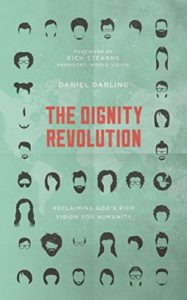 The Dignity Revolution: Reclaiming God’s Rich Vision for Humanity Daniel Darling (The Good Book Company) $16.99 Forty some years ago we were somewhat involved in an organization that tried to bear witness amongst the anti-war and anti-nuclear weapons movement that concern for pre-born humans should also be a part of their agenda. Peaceniks often marched under the banner of the famous verse from Deuteronomy “Choose Life.” Similarly, we’d attend Right to Life events and try to convince our anti-abortion friends that targeting millions of civilians, including children, as our nuclear weapons strategy does, is not very pro-life. I suppose it doesn’t need explained that we were physically removed from at least one anti-war gig and verbally assaulted plenty from the anti-abortion events. Nobody wanted to be very consistently pro-life; most didn’t even want to talk to each other.
The Dignity Revolution: Reclaiming God’s Rich Vision for Humanity Daniel Darling (The Good Book Company) $16.99 Forty some years ago we were somewhat involved in an organization that tried to bear witness amongst the anti-war and anti-nuclear weapons movement that concern for pre-born humans should also be a part of their agenda. Peaceniks often marched under the banner of the famous verse from Deuteronomy “Choose Life.” Similarly, we’d attend Right to Life events and try to convince our anti-abortion friends that targeting millions of civilians, including children, as our nuclear weapons strategy does, is not very pro-life. I suppose it doesn’t need explained that we were physically removed from at least one anti-war gig and verbally assaulted plenty from the anti-abortion events. Nobody wanted to be very consistently pro-life; most didn’t even want to talk to each other.
Except, that is, a few radical Catholics and Mennonites and friends at ESA and Sojo who developed a consistent life ethic and who stood up for the poor, those trafficked and enslaved, the prisoners, who opposed the death penalty and abortion, who were anti-war and pro-environment. These consistent life folks decried racism and affirmed the dignity of the unborn and the aged, advocated for the rights of the disabled, thought about immigrants and sex abuse and pollution and war and the sexism that plagues us all, all in the same ethical category, asking: what does it mean to be consistently pro-life?
This new book by Daniel Darling, Vice President for the Southern Baptist Ethics and Religious Liberty Commission is not quite like that — he’s no Mennonite pacifist nor a Daniel Berrigan and he’s not part of “Feminists for Life.” But, nonetheless, this is one of the closest books we’ve seen in decades to so very deeply remind us that the theological notion of human dignity — we are all made in the image of God and have God-given dignity! — should loom large over all our social and ethical quandaries. It is, as Albert Mohler puts it, “a compelling and careful articulation” of human dignity.
Or, Ann Voskamp says, “This may be one of the most important books of our time.”
Speaking of the dignity of the disabled, one of our finest writers and sharpest minds within evangelical Christianity these past decades has been Joni Eareckson Tada, living with paraplegia, who types stuff like this with her specially adapted equipment: “The definition of “human being” is being altered, and the impact is creeping into hospitals, schools, and businesses. This is a must-read for every Christian.” Yep, from deep questions of bio-ethics (which Joni has studied and written about) to new discussions about the “trans-human” we simply have to recover a classic, theologically robust vision of the human person. So much depends upon it, and this book invites to a “dignity revolution” which could impact how we treat others (in the grocery store line or on-line) and how we think about abortion, euthanasia, capitol punishment, the poor, the sick, the refugee, race relations, and more.
Indeed, this is a book to consider, to debate, to ponder what implications it might have. As Michael Ware, formerly of the Obama White House, who described his own principles about a consistent sort of life ethic in his book Reclaiming Hope challenges:
“Consider this book carefully, and then act to implement its vision in your life.”
As the legendary White Album puts it: “You say you want a revolution?” This is it!
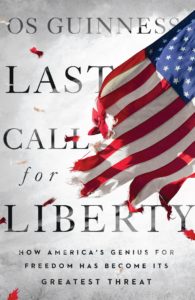 Last Call for Liberty: How America’s Genius for Freedom Has Become Its Greatest Threat Os Guinness (IVP) $27.00 Any time this excellent speaker and writer, social critic, and Christian leader writes, we would do well to pay attention. This is one of Dr. Guinness’s major works, and it isn’t simple or trite. It is — from his point of view as an Englishman living in the DC area — a love letter to America, and a caring chastisement, we might say, to those of us who take our liberties for granted. He is stern, here, about how most Americans (not to mention our civic and religious leaders) simply don’t know what we should about the profundity and genius of the American experiment (not to mention profound Judeo-Christian influences such as notions of covenant) and the gravity and urgency of the threats poised against these revolutionary ideas. He is not (although in some ears could be heard to be) an advocate of the “Christian America” thesis nor is he an advocate of a glib sort of civilc faith that extols civil religion dressed up with a MAGA hat. He is a serious, nonpartisan, deeply Christian observer, alarmed at the drift of our way of life and not optimistic about lessening the erosion of our civility, nor our mutual commitments to uniquely American ideals and principles.
Last Call for Liberty: How America’s Genius for Freedom Has Become Its Greatest Threat Os Guinness (IVP) $27.00 Any time this excellent speaker and writer, social critic, and Christian leader writes, we would do well to pay attention. This is one of Dr. Guinness’s major works, and it isn’t simple or trite. It is — from his point of view as an Englishman living in the DC area — a love letter to America, and a caring chastisement, we might say, to those of us who take our liberties for granted. He is stern, here, about how most Americans (not to mention our civic and religious leaders) simply don’t know what we should about the profundity and genius of the American experiment (not to mention profound Judeo-Christian influences such as notions of covenant) and the gravity and urgency of the threats poised against these revolutionary ideas. He is not (although in some ears could be heard to be) an advocate of the “Christian America” thesis nor is he an advocate of a glib sort of civilc faith that extols civil religion dressed up with a MAGA hat. He is a serious, nonpartisan, deeply Christian observer, alarmed at the drift of our way of life and not optimistic about lessening the erosion of our civility, nor our mutual commitments to uniquely American ideals and principles.
Yet, as an evangelical and deeply devoted Christian, rooted in Reformation thought and the piety and practices of Anglican spirituality, he is one with great hope. (Read his book from just a few years ago, Renaissance: The Power of the Gospel However Dark the Times, for a good dose of Christian hope that isn’t rooted in naive optimism, and is Guinness at his biblical best.) In order to be faithful and hopeful, he offers us this guide. Last Call for Liberty — intentionally designed with a tattered flag on the sober cover — formulates 10 key questions that each American must answer. These questions are profound for all of us, regardless of our party affiliation or how much or how little we ourselves experience the tension with the times. It is my sense that these questions should be asked/discussed communally, too — as families and churches and organizations and non-profits and civic groups and colleges, we must all grapple with our understanding of these 10 big questions.
Guinness says that the American republic is suffering “its gravest crisis since the Civil War.” I don’t know if this is so, but we all feel the awfulness of these days, ache for greater civility and common ground, and many of us are deeply dismayed. Perhaps those with more conservative leanings are more deeply aware of how our judiciary and institutions that are crucial to freedom are failing; we need more than better manners to restore the structures for pluralism and e pluribus unam. It isn’t necessary to harp on how conflicted we are as our divisions about the current President are merely a symptom of as deeper malaise. I do not think Guiness’s big 10 questions are the only way to get at the root of our crisis, and there other obviously other questions about other matters, but we should know that the crisis is deeper than we know. As Guinness makes very clear, it is not primarily about Trump.
Part of the genius of Last Call for Liberty is how Guinness repeatedly, consistently, raises the question of what view of freedom we have, what assumptions about freedom and liberty we hold. The big question for him is if we are guided and indebted to the ideals and ethos and values and convictions of those who proposed the revolution of 1776 or to the one known as the French Revolution of 1789. He might have been a bit more explanatory for those who don’t immediately know the difference but as he walks us through this 300 page treatise it becomes a liturgy, clarifying and shaping our deepest desires: 1776 or 1789? 1776 or 1789?
As always, Guinness is literate, historically informed, eloquent and passionate. He feels this stuff deeply; of course, mostly because of his study and convictions but also because, as a child, he witnessed first hand the climax of the brutal Chinese revolution in 1949 where he lost loved ones (his parents were medical missionaries there) and was eventually expelled by the draconian powers there in 1951. He has seen repression, even as he has travelled all over the world, realizing deeply the depth of injustice and the consequences of ideas. (See his powerful book about the challenge of evil in the world called Unspeakable, which shows his profound social conscience and awareness of God’s deep care for the poor and oppressed.) The new Last Call book is chock full of quotes and epigrams from writers and thinkers as diverse as G.K. Chesterton and Leo Tolstoy, Berthold Brecht and Ambrose Bierce, his beloved Winston Churchill and Thucydides and Abigail Adams and Lord Rabbi Jonathan Sacks. He is profoundly indebted in Abraham Lincoln, and partial to Yuval Noah Harari and Abraham Joshua Heschel and, naturally, Alexis de Tocqueville and Edmund Burke, whose insight about the French revolution is indispensable.
The women and men Dr. Guinness thanks in his lovely, sincere, acknowledgements are notable and yet, he is, in this field at least, one of the most widely-read gentleman I have ever met. Don’t miss this book. Last Call for Liberty (whether you agree with its assessment or not) is a treasure to read; urgent for anyone concerned about the constitutional republic and restoring our “better angels” to our current state of affairs.
As he says more than once, and solemnly in the last paragraph,
America, America, freedom is at stake. Act worthy of yourselves, your great experiment in freedom, your unfinished story, and the challenge of the hour and of humanity. God, history, and the watching world await your answer.
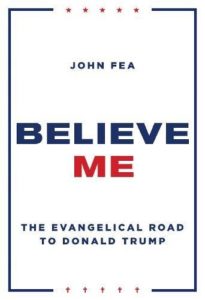 Believe Me: The Evangelical Road to Donald Trump John Fea (Eerdmans) $24.99 I have written at great length — in our local newspaper, in BookNotes, and on my social media space — that the unqualified conservative Christian support for President Trump is inexplicable. For a dozen reasons that are nearly incontrovertible, it is clear that the President is a bad man and a bad leader. By no reasonable metrics can we be glad for his temperament, his antics, or his odd-ball style of governance. Good people of good faith can disagree with the “lesser of two evils” sorts of complicated choices we have when voting and can line up on different sides of the isles as we watch the sausage getting made. But all serious Christians must, at least, have some sort of Biblically-informed, Christianly conceived, spiritual-driven, public theology. We must have “the mind of Christ” and allow the Scriptural worldview to illumine our views of contemporary issues and the nature of law and politics and citizenship. Evangelicals, who love Jesus, insist on conversion and holiness, and Christ’s Kingship over all of life and regard the Bible with a for-all-of-life authority. We dare not say, as Jerry Falwell Jr. recently did, “I don’t look to Jesus for my politics.” Evangelicals worthy of the name may disagree about many implications that flow from a Christian political vision, but we dare not say that.
Believe Me: The Evangelical Road to Donald Trump John Fea (Eerdmans) $24.99 I have written at great length — in our local newspaper, in BookNotes, and on my social media space — that the unqualified conservative Christian support for President Trump is inexplicable. For a dozen reasons that are nearly incontrovertible, it is clear that the President is a bad man and a bad leader. By no reasonable metrics can we be glad for his temperament, his antics, or his odd-ball style of governance. Good people of good faith can disagree with the “lesser of two evils” sorts of complicated choices we have when voting and can line up on different sides of the isles as we watch the sausage getting made. But all serious Christians must, at least, have some sort of Biblically-informed, Christianly conceived, spiritual-driven, public theology. We must have “the mind of Christ” and allow the Scriptural worldview to illumine our views of contemporary issues and the nature of law and politics and citizenship. Evangelicals, who love Jesus, insist on conversion and holiness, and Christ’s Kingship over all of life and regard the Bible with a for-all-of-life authority. We dare not say, as Jerry Falwell Jr. recently did, “I don’t look to Jesus for my politics.” Evangelicals worthy of the name may disagree about many implications that flow from a Christian political vision, but we dare not say that.
And so, it is essential to try to figure out the coherence, if there is any, of the so-called Christian right. Those that know me know that this has been huge priority for me for decades and decades and I have invested much personal energy of my life time to help create conversations around the meaning of the Lordship of Christian for our citizenship and public lives. Sometimes I find it necessary to challenge the right and the left and I often try to graciously insist that we should have no fundamental loyalties to the conservatives or the liberals. For whatever reason, these days, I find a much greater interest in the Bible and Jesus from the progressive side than from most on the side of the Christian right, and that is different than it was a generation ago, and feels exceptionally ironic.
Still, as black evangelist Tony Evans once said, when Jesus comes back he will not be riding a donkey or an elephant. Or, more seriously, as David Koyzis writes, we must get at the deep philosophical influences of the Enlightenment and French Revolutions to understand our current political divides. (See his brilliant, deep Political Visions & Illusions: A Survey & Christian Critique of Contemporary Ideologies for a sophisticated explication of this rejection of the right and the left as we seek for a uniquely Christian third way.)
Which is a long way of saying why I am declaring Believe Me as one of the most important books to be published in 2018 and predicting that it will remain one of the most important books for many a year.
Look: I don’t agree with all of the analysis Dr. Fea brings, and I wish he had covered stuff that he misses. In this sense it may not be utterly adequate but it is nonetheless the best book in recent years on the new itineration of the Christian right in the Trump years. Fea is a respected historian and brings his discerning critical eyes to what he calls “the court evangelicals.” There is no other book like it.
Good historians such as George Marsden have given big accolades to Believe Me. For instance, the always measured Mark Noll writes:
John Fea’s timely and sobering book shows convincingly how legitimate concerns from white evangelical Protestants about a rapidly secularizing American culture metastasized into a fear-driven brew of half-truths, fanciful nostalgia, misplaced Christian nationalism, ethical hypocrisy, and political naiveté–precisely, that is, the mix that led so many white evangelicals not only to cast their votes for Donald Trump but also to regard him as a literal godsend.
Few contemporary Christian thinkers and advocates for a balanced public theology are as wise and balanced as Richard Mouw. His own memoir is the Adventures in Evangelical Civility: A Lifelong Quest for Common Ground and he knows much about hearing various viewpoints and showing “uncommon decency” as his book on civility puts it. And about Fea and Believe Me, Mouw says this:
While the significant support for Donald Trump by white evangelicals has been the stuff of headlines, there has been little serious probing of the deeper factors at work. John Fea here gives us what we need, with his insightful tracing of the theological-spiritual road that has brought us to this point. A wise and important book!
Believe Me: The Evangelical Road to Donald Trump by Messiah College prof and Hearts & Minds friend (and blogger extraordinaire ) Dr. John Fea deserves a, extra award medal for all he’s done promoting conversation around this book. He has helped us understand the contemporary interface of Christian faith and modern politics and while it isn’t the last word, it is a very, very important contribution. I’m glad other outlets more important than BookNotes have named this as one of the outstanding books of 2018.
Listen to Jana Riess, a senior columnist for Religion News Service:
It would be enough for John Fea to marshal his considerable prowess as a historian in proving how evangelicals have been propelled by fear, nostalgia, and the pursuit of power, as he does so compellingly in this book. But he also speaks here as a theologian and an evangelical himself, eloquently pointing toward a better gospel way. This is a call to action for evangelicals to move beyond the politics of fear to become a ‘faithful presence’ in a changing world.
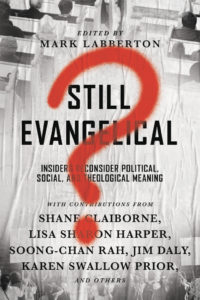 Still Evangelical?: Insiders Reconsider Political, Social, and Theological Meaning edited by Mark Labberton (IVP) $17.00 . I have written at length about this book when it first came out and I hope that our BookNotes review then garnered it some attention. It’s a wise and interesting and helpful book for any evangelical, and for anyone that has even a bit of interest in what that part of the church pew, many who sit on the right side of the church, are like these days. What this really does is ask the tough question if this phrase — evangelical — is worth saving, clarifying, using, or not. Again, we think this is a very important question and the authors of this book, themselves insiders to the movement, have different answers to the existential question.
Still Evangelical?: Insiders Reconsider Political, Social, and Theological Meaning edited by Mark Labberton (IVP) $17.00 . I have written at length about this book when it first came out and I hope that our BookNotes review then garnered it some attention. It’s a wise and interesting and helpful book for any evangelical, and for anyone that has even a bit of interest in what that part of the church pew, many who sit on the right side of the church, are like these days. What this really does is ask the tough question if this phrase — evangelical — is worth saving, clarifying, using, or not. Again, we think this is a very important question and the authors of this book, themselves insiders to the movement, have different answers to the existential question.
The women and men who contribute to this book are all well worth hearing, and they each bring a certain passion or expertise to the conversation. Still Evangelical includes Lisa Sharon Harper, Lauren Winner,
Here is the table of contents that will help you see why we think it is such a great book, covering such important and interesting concerns. We hope you send us an order and think this through yourself.
- Will Evangelicalism Surrender? (Lisa Sharon Harper)
- Why I Am an Evangelical (Karen Swallow Prior)
- Recapturing Evangelical Identity and Mission (Mark Young)
- Immigration and the Latina/o Community (Robert Chao Romero)
- Evangelical Futures (Soong-Chan Rah)
- Theology and Orthopraxis in Global Evangelicalism (Allen Yeh)
- Remaining to Reform (Sandra Maria Van Opstal)
- Looking for Unity in All the Wrong Places (Mark Galli)
- Evangelicalism Must Be Born Again (Shane Claiborne)
- The Importance of Listening in Today’s Evangelicalism (Jim Daly)
- Hope for the Next Generation (Tom Lin)
Our hats are off to all of these contributors and for those grappling with religious idenity, wanting to be true to the consciences, true to their understanding of Scripture, and continue to abide in Jesus, even as they try to discern how and with whom and with what words to do that before the watching world.
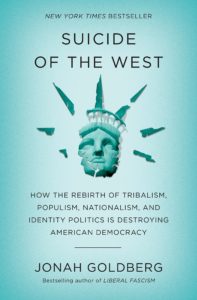 Suicide of the West: How the Rebirth of Tribalism, Populism, Nationalism, and Identity Politics Is Destroying American Democracy Jonah Goldberg (Crown Forum) $28.00 Well — it is getting so late I just don’t have the capacity to carefully review this now although, believe me, I’ve tried. In fact, even if I was bright and chipper and at my best I am not sure I can tell you why I want to commend this book. It is big and heavy and serious and at times tedious, with a lot of fascinating footnotes, too — except when it’s not; Goldberg is known for his nearly gonzo humor and although he restrains himself in this heady work, it does have it’s clever moments. He is witty and smart and maybe only somewhat right, but this is a great book that took years to write. It is certainly a notable book of the year and I wish others would consider it carefully.
Suicide of the West: How the Rebirth of Tribalism, Populism, Nationalism, and Identity Politics Is Destroying American Democracy Jonah Goldberg (Crown Forum) $28.00 Well — it is getting so late I just don’t have the capacity to carefully review this now although, believe me, I’ve tried. In fact, even if I was bright and chipper and at my best I am not sure I can tell you why I want to commend this book. It is big and heavy and serious and at times tedious, with a lot of fascinating footnotes, too — except when it’s not; Goldberg is known for his nearly gonzo humor and although he restrains himself in this heady work, it does have it’s clever moments. He is witty and smart and maybe only somewhat right, but this is a great book that took years to write. It is certainly a notable book of the year and I wish others would consider it carefully.
Here’s just two things you should know. Goldberg used to be a wild-eyed leftist but, as many such young idealists find, their Che berets and Jack Kerouac motorcycles don’t quit comport with the real world and its deep needs and he settled down, began to study the intellectual ideas and ideals of classic, serious-minded conservatives. He is one of those noble right wing guys in the tradition of William F. Buckley — who through intellectual prowess and sheer determination ran the racist John Bircher’s out of the Goldwater movement — who cannot abide the values and dispositions of Donald Trump; not because Trump is a conservative, but because, in a way, he’s not a real conservative. Goldberg knows that at the heart of historic conservatism lies individual virtue, and the narcissism and greed and irreligion and lust for power and petty meanness and intellectualism and nationalism of the current President does not build up our civic strengths nor help the Republican party or our democracy. They call these guys “Never Trumpers” and they are a principled crew within the conservative intelligentsia who call out those who have accommodated their values and virtues to the allow them to support Mr. Trump. So, Goldberg is a principled, funny, and serious conservative at the American Enterprise Institute who writes a must-read column in National Review online.
Goldberg’s earlier book, Liberal Fascism: The Secret History of the American Left, from Mussolini to the Politics of Change, took issue with how liberals tend to misunderstand fascism and argued that the threat of power-brokering control comes less from the right than from the left. For many of us it was a counter-intuitive analysis, but the book was a blast and made me think.
If Liberal Fascism made me think, Suicide of the West made my head hurt. Okay, that’s not really true, but it was pretty scholarly for a best-seller. It is a gift to be able to write a book that fast moving but still detailed, sweeping intellectual history without generalizations (at least not too many) and both oddly acerbic and generous. I guess what I mean is that he can be feisty and forthright in his denunciation of dumb ideas and that it cuts both ways. He brings strong critique to those I disapprove of and next thing you know he’s hitting a bit too close to home. I like that he attempts to be fair and not idealogical.
Which is, in fact, the point: those who adopt what I would call an idolatrous reductionism, end up as cheap populists, complaining about how identity politics on the left is hurting our country, breaking unity over who is most aggrieved, all the while sounding as tribal and ideological as anyone. What an irony that those decrying identity politics the loudest are those on the Trumpian right. It should be clear from the subtitle of this conservative book that his critique is as much against the far right as it is the cultural left. I guess you see why I like it — a big, sweeping genealogy of ideas and showing that too often, the right has bought into ideas that are themselves not adequate. In this regard, this important book should appeal to those who appreciate Os Guinness, say, or never-Trumpers like moderate, wise, conservatives such as Michael Gerson and David Brooks and Yuval Levin.
The great Levin, by the way, says of it:
“More than any book published so far in this century, it deserves to be called a conservative classic.”
There are critiques to be made of his own idolatries and the are significant. I think he means well, and I like that about him, but I think he is wrong about some of his intellectual history and some of his policy proposals. But that’s not the point here. It was thrilling to read a book like this — even if well over 450 pages — and a good intellectual exercise for his small town bookseller. Here are a few other good endorsements that will hopefully illustrate why I list this in our 2018 list of most interesting books.
Jonah Goldberg’s Suicide of the West is a tour de force. As ever, Goldberg wears his extraordinary erudition lightly as he demonstrates how the ideas that have animated free societies for the past 250 years are the greatest creations of humankind–and how we are imperiling our posterity by the way we mishandle, ignore, and belittle them. This is a very important book.
–John Podhoretz, Editor, Commentary Magazine“
Populism and identity politics are not just unpleasant; they are an existential threat to the American way of life. With characteristic wit and erudition, Jonah Goldberg argues that if you value democracy and a free society, you must stand against ideological tribalism, no matter what your politics. Suicide of the West raises an alarm everyone needs to hear, and makes clear the path we need to take.
–Arthur C. Brooks, President of the American Enterprise Institute
I am not sure I am as much of a fan as these two are, and certainly not as sure as this next blurb, but it’s so fun — and it sounds like something Jonah himself might pen — that I’ll share it with you, laughing that of course I want to list a book that ends up having endorsing blurbs like this!
When future archeologists are digging through our ruins and asking, as they will ask, ‘What the hell were they thinking?’ I hope they come upon a copy of Suicide of the West, and that it is only slightly charred from the bonfire into which the mad idiot ideologues of our time are sure to cast it.”
–Kevin Williamson, National Review correspondent
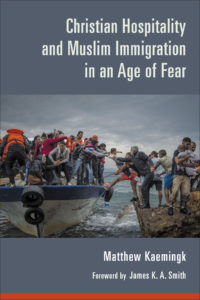 Christian Hospitality and Muslim Immigration in an Age of Fear Matthew Kaemingk (Eerdmans) $28.00 I did a major review of this before it got to be a much-talked about study, and I am proud to have been an early cheerleader. This is without a doubt one of the more important and substantive books of 2018 and it is offers a very nuanced, even surprising analysis of the modern West’s immigration and refugee crisis and Muslim-Christian relations.
Christian Hospitality and Muslim Immigration in an Age of Fear Matthew Kaemingk (Eerdmans) $28.00 I did a major review of this before it got to be a much-talked about study, and I am proud to have been an early cheerleader. This is without a doubt one of the more important and substantive books of 2018 and it is offers a very nuanced, even surprising analysis of the modern West’s immigration and refugee crisis and Muslim-Christian relations.
You’ll have to go back to my earlier BookNotes review or the many other reviews to understand all this, but the short version is this: Kaemingk studies the political and social philosophy of the early 20th century conservative Christian political leader in Holland, Abraham Kuyper, whose view of pluralism and common grace set the Netherlands on a course to become a nation and culture which affirmed the “worldviewish” nature of life and therefore became eagerly open to diversity and hosted a variety of perspectives, robustly, even. There was room for all in this small Calvinist culture — they government funded, fairly, alternative schools and newspapers so lots of ideas could be considered and minorities were not tyrannized by the majority rule. This theologically-rooted social architecture (with a Christian political party to enhance such cultural attitudes and structural pluralism — Kuyper became the Prime Minister, after all) led to an open and liberal attitude towards immigrants.
In what seemed like less than a year, Holland turned away in the early twenty-first century from that open-minded and generous attitude towards outsiders and, with a tide of alt-right, anti-Muslim hostility (stimulated by the brutal murder of a descendant of Vincent Van Gogh by a jihadi/Islamist terrorist) became one of Europe’s most hostile countries to refugees and immigrants.
In Matt Kaemingk’s capable hands this becomes more than a parable, even more than a case study, but a hefty dose of deeply principled wisdom for these days. He offers a splendid (page-turning at times) account of the rise of Christian-based arguments for pluralism and, using Kuyperian Holland as a case study, how this does and doesn’t help with the huge question of immigration today. With today’s vivid headlines as a backdrop, Christian Hospitality is deep and thoughtful and urgent. One reviewer called it “winsome” while another called it “wonderfully written and ambitious.” James K.A. Sith has a fabulous foreword saying it is a “singular book… Here is the public theology we need today.”
Hear Christian political theorist Jonathan Chaplin:
A pathbreaking, theologically rich Christian intervention into contemporary public debates over the place of Muslims in Western societies… Matthew Kaemingk has pulled off a feat many would thought thought impossible.
We care about the immigration crisis and have plenty of books reminding us to care for outsiders. We have books about inter-faith conversations and plenty of other resources that would be good for beginners in this area. But Christian Hospitality and Muslim Immigration in an Age of Fear stands out as an extraordinary study, a book unlike any other, that is deserving of an award for one of the very Best Books of 2018.
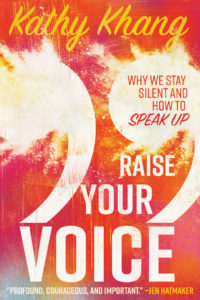 Raise Your Voice: Why We Stay Silent and How to Speak Up Kathy Khang (IVP) $16.00 I have mentioned this book a couple of times — at BookNotes and that special column I did in the Public Justice Report — and have been glad to get to recommend it. It is, as the titles says, a book about speaking up. It evaluates various motivations for civic involvement, tells how to be involved, and offers sage advise about civility and more. Nikki Toyama-Szeto, executive director of Evangelicals for Social Action, who knows a thing or two about all this, says “Raise Your Voice is honest, funny, and utterly practical.” Rachel Held Evans talks about its “integrity and holy force.“
Raise Your Voice: Why We Stay Silent and How to Speak Up Kathy Khang (IVP) $16.00 I have mentioned this book a couple of times — at BookNotes and that special column I did in the Public Justice Report — and have been glad to get to recommend it. It is, as the titles says, a book about speaking up. It evaluates various motivations for civic involvement, tells how to be involved, and offers sage advise about civility and more. Nikki Toyama-Szeto, executive director of Evangelicals for Social Action, who knows a thing or two about all this, says “Raise Your Voice is honest, funny, and utterly practical.” Rachel Held Evans talks about its “integrity and holy force.“
There are social forces (including our own families, as Khang herself experienced) who try to silence or diminish our voices. There are spiritual and emotional hurdles and prices to be paid for speaking up. Raise Your Voice will help avoid the ugly side of social media and help you navigate power dynamics and other barriers to overcome if we are going to be faithfully engaged in the public square. Although it pays special attention to the dynamics sometimes faced by women and people of color, this is for all of us, a fine and wise resource that is a fabulous read. Kudos, again, to IVP, for bringing to us a book that is unlike anything else available.
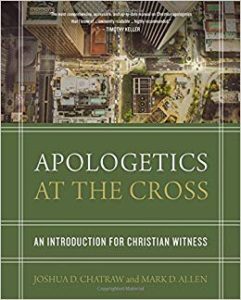 Apologetics at the Cross: An Introduction for Christian Witness Joshua D. Chatraw and Mark D. Allen (Zondervan) $34.99 We have bunches and bunches of books on evangelism, or storytelling the gospel, or apologetics both evidentialist and presuppositional and all manner of reasonable and postmodern styles. It is a fascinating field and I’m sad that more don’t deeply delve into resources to help them bear witness and help others along in the journey of coming to deeper and more confident faith. There is no doubt, though, that the art of apologetics, of being prepared to explain the hope we have in Christ, needs to be re-learned from generation to generation. In these times — influenced by social media and what Taylor called “The Secular Age” and the cynicism many have about religion — we simply have to be more savvy if we want to connect well with others, including the unchurched and the de-churched and the young who are making up their minds about faith in this hyper-modern, pluralizing social context. Apologetics at the Cross is a masterful, comprehensive guide that takes our cultural context seriously. It is presented like a lively textbook and is very highly recommended for personal use and for classes. (There is a remarkable set of video lectures on DVD by the author as well.)
Apologetics at the Cross: An Introduction for Christian Witness Joshua D. Chatraw and Mark D. Allen (Zondervan) $34.99 We have bunches and bunches of books on evangelism, or storytelling the gospel, or apologetics both evidentialist and presuppositional and all manner of reasonable and postmodern styles. It is a fascinating field and I’m sad that more don’t deeply delve into resources to help them bear witness and help others along in the journey of coming to deeper and more confident faith. There is no doubt, though, that the art of apologetics, of being prepared to explain the hope we have in Christ, needs to be re-learned from generation to generation. In these times — influenced by social media and what Taylor called “The Secular Age” and the cynicism many have about religion — we simply have to be more savvy if we want to connect well with others, including the unchurched and the de-churched and the young who are making up their minds about faith in this hyper-modern, pluralizing social context. Apologetics at the Cross is a masterful, comprehensive guide that takes our cultural context seriously. It is presented like a lively textbook and is very highly recommended for personal use and for classes. (There is a remarkable set of video lectures on DVD by the author as well.)
If you don’t believe me that a book of this nature deserves to be celebrated and promoted as a BookNotes Best of the Year, listen to this, from our friend Jamie Smith:
Just when you think this book is the comprehensive apologetics textbook you’ve been looking for–covering Scripture, history, philosophy, and culture–you realize it’s also something more: a creative, original proposal for an ‘inside-out’ apologetic that is precisely what we need in our secular age. If you’re skittish about ‘apologetics, ‘ like I am, this book will show you another way. — James K. A. Smith, professor of philosophy, Calvin College, and author of You Are What You Love
Or, how about this, from Timothy Keller, author of Reason for God and :
In our culture, the practice of apologetics has moved from being a ’boutique’ topic for specialists to being a requirement for even having a conversation with one’s neighbor. Joshua Chatraw and Mark Allen have produced the most comprehensive, accessible, and up-to-date manual on Christian apologetics that I know of. Despite how full its treatment of the subject, it is eminently readable. The authors present all the various approaches to apologetics respectfully, proposing their own pathway that incorporates a large range of insights from many disciplines and thinkers. Highly recommended. — Timothy Keller, pastor emeritus, the Redeemer Presbyterian Churches of New York City
BookNotes

SPECIAL
DISCOUNT
+++
ANY BOOK MENTIONED
20% OFF
+++
order here
this takes you to the secure Hearts & Minds order form page
just tell us what you want
inquire here
if you have questions or need more information
just ask us what you want to know
Hearts & Minds 234 East Main Street Dallastown PA 17313
read@heartsandmindsbooks.com
717-246-3333
